#before realizing that they were actually a gender nonconforming cis person
Text
very controversial trans take; detransitioners are not our enemy. they're people who took the time to question their gender, to explore their identity inside and out, and came to the conclusion that their identity best aligns with what they were assigned at birth. i wish everybody could take the time to sit and think deeply about the identities they hold, particularly things like gender that are inherent, but also deeply socialized. the detransitioners who are spouting anti-trans rhetoric have been taught by the system we live in that even questioning your gender is wrong, so for many of them, that rhetoric is a survival tool for assimilating back into cis society. doesn't make it okay to hold anti-trans views, for certain, but it does expose the fact that the enforcement of a restrictive gender binary hurts everyone, even cis people.
#nobody is helped by the gender binary#that's not to say that people cannot identify as men and women lol#that tends to be the takeaway a lot of ppl get when i talk about this#it means that forcing everybody to identify within the categories of man and woman is harmful because not everybody is a man or a woman#also the gender binary enforces such strict roles for men and women that anybody who deviates from those is punished#this was inspired mostly by the fact that i had a really cool conversation today with a person who had detransitioned#i went to the food bank bc a bitch got medical bills ahaha#and had a neat conversation with a person who was on T for seven years and went through tons of deep identity processing#before realizing that they were actually a gender nonconforming cis person#they're also black so we talked a lot about the ways that the gender binary harms BIPOC folks#she's a masc lesbian so she doesn't present her gender in the same way as a femhet woman might#and much of the standards we hold in the western gender binary are racist bc they're based solely on white ideas of gender#everything from hair to clothes to eyes#beef speaks#beef's queer theory
5 notes
·
View notes
Text

It is NOT BOY MODING. It is A TOMBOY AND It LIKES THE WAY It DRESSES.
By lain. It its she they.
It amazes me when It sees this word brought up on the internet. The term Boy Moding is used and often applied to trans women who use Boy clothing and fashion to hide the effects of HRT to be able to pass through safely without being clocked or singled out for being transgender. But it seems, at least to it, that this term often gets applied to women of it's variety without question of what they actually identify as. To it, the term "Boy moding" is rooted and based on passing culture and societal standards of what women should look like, act, think, and express themselves. For instance, I my self personally Identify as a tomboy. Which is a term often applied to cis women who have a preference for Boy clothing. This isn't to say that I don't own dresses or skirts or other articles of clothing how ever, I personally tend to pair these items with over sized hoodies, t shirts, and various crop tops that I've made over the years even before I came out of the closet. To that effect I will say that I believe there is a stark difference between subcultures within the lgbtqia+ and I am here to provide some nuance to this conversation.
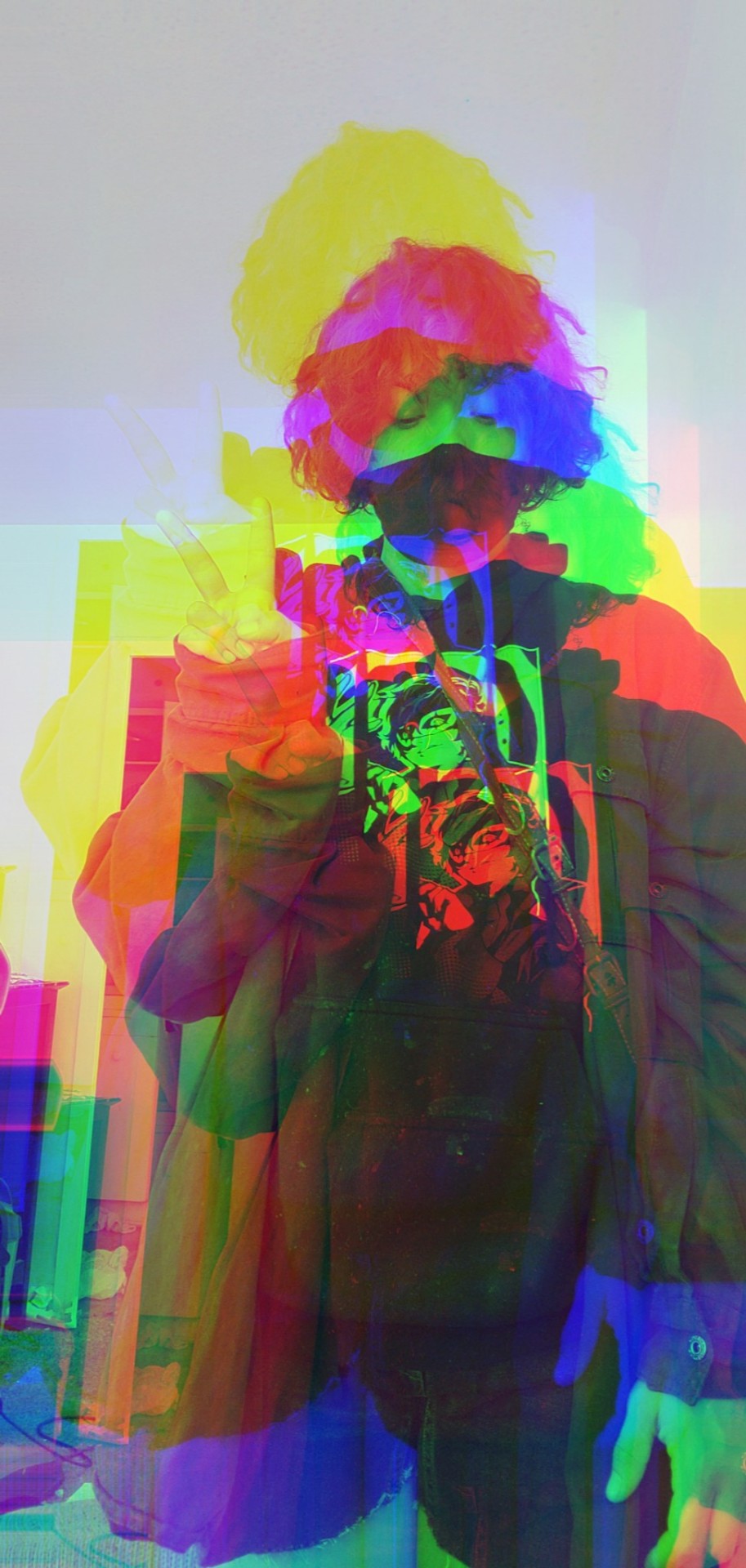
It guess you could say for my own personal identity that there is also a community behind it. There are alot of stereo types that It fits when it comes to generalizing trans women. There are a lot of girls who are actually hyper passing dolls, i.e. a few of it's friends who are in the drag community. The ones who try to blend and pass as what our society has labeled as a woman. And then there are girls like it, who embrace the more counter culture type of aspects of being a woman as well as being gender nonconforming. Girls who are like me reject traditional gender norms as well as challenge the definition of femininity. I remember one conversation that I had with my sister M. I used to be a full service sex worker and I was thinking about taking it up again and she had said, "If you really want to get back into sex work you will have to ask yourself what matters more to you, passing or being your self." That sat with me very much and she kind of got in my head about it. At first i thought, "maybe I can do both I'm pretty attractive." But then I realized that sex work really wasn't for me because I am not willing to compromise characteristics that make me a more complete person as a whole for capital.

With this being said, It believe that to help with the stigma that goes a long with being A. Labeled as a "boy moder" and B. Being misgendered based solely on the appearance of how you present your own version of being gender nonconforming in internet spaces as well as public spaces. Recently it got misgendered at work. The owner of the restaurant it washes dishes at had used second person pronouns to address it when it uses third person pronouns preferably even in the work place. When the discussion was had, the owner of said restaurant had flat out refused to use its preferred pronouns and had its identity denied. After that it had spent the whole shift crying, contemplating, formulating an escape plan because all it could think about were the times that it had its gender questioned or policed in many hostile work environments. The evidence while clearly anecdotal is a prime example of what transgender women, and trans gender tomboy women have to deal with 9/10 times on any given day of the fucking week.

To wrap things up, we discussed that The term Boy Moding is used and often applied to trans women who use Boy clothing and fashion to hide the effects of HRT to be able to pass through safely without being clocked or singled out for being transgender. How ever over the course of this post we break down the terms loosely and talk about how very prominent distinctions there are in subcultures between trans and queer people. We also talk about the ways that passing culture can effect the ways we view and perceive subcultures and how these perceptions can make it difficult for gender nonconforming people to navigate in social spaces. Now referring to itself in the first person, to me I think the term Boy moding is gross. Boy moding is a way for people to gender all of us incorrectly and keep more struggling women in the closet. If you are non binary, or any form of gender non conforming person hear this. It is okay to be a woman and still embrace masculinity. Boy clothing does not make it any less of a woman nor does being identifiably trans make it a man pretending to be a woman.
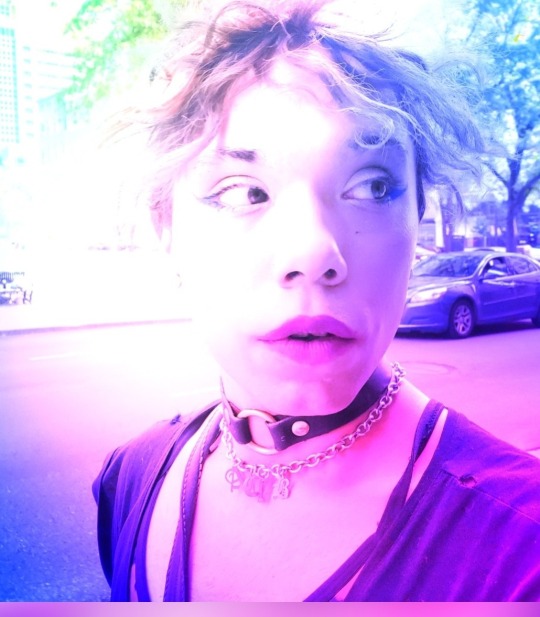
It is NOT BOY MODING. It is A TOMBOY AND It LIKES THE WAY It DRESSES.
It feels femme even though it doesn't identify as a regular human. It feels feral when the full moon comes. It likes to bite the ones it loves. It wears jeans sometimes to work or maybe sometimes a skirt. Even though it's a creature that causes alot of messes. It IS NOT BOY MODING. IT IS A TOMBOY AND IT LIKES THE WAY IT DRESSES.
6 notes
·
View notes
Note
Seeing your posts about JHY, I’d like to ask: What are your feelings towards SS being accused of transmisogyny, bi/homophobia and gaybaiting as well as the various LGBT-related criticisms leveled at ORV? I apologize if this seems out of the blue, tonedeaf or if you’ve made your stances clear already.
It is pretty out of the blue! Am I being interviewed for something! And to be honest, my personal orv tag is really small and I think I’ve made myself pretty clear. But you know, I love talking so I’ll take this opportunity with pleasure.
How I feel is: um. Happy they’re being criticized? I mean, Sing Shong are adults writing a very popular book with tons of exposure for lots of money now, and if people notice homophobic, transphobic, or really any kind of prejudicial content in their work, then the reader base has the right to bring that up and ask them to confront it. I think people should call these kinds of things to their attention all the time. So, ah, those are my feelings. I think it’s important to acknowledge these failings and inform others seeking to engage with this book about those failings, so that they can then engage with ORV forewarned and forearmed.
Of course, I think there are some interesting things to consider about ORV re: LGBT “representation”, such that it is.
1. Gaybaiting/Homophobia/Biphobia
I don’t think gaybaiting is what’s happening in this novel. Or rather, Sing Shong made a bunch of tacky jokes about “does dok/hyuk is gay”, then they stopped making those jokes, and the rest is fandom having fun with character relation ships AKA the essence of shipping. Sing Shong had no directed engagement with fans desiring gay ship content, and in my mind, without that deliberate marketing of the possibility of your fave gay ship getting together, we don’t really achieve the necessary level of focused teasing that “bait” would require. In addition, ORV isn’t a romance novel; there is no core straight relationship that before which any teasing of this gay relationship is doomed to fail. Either way, it’s undeniable that the theoretical gayness of their relationship was something the novel initially made jokes about, and it is also something that the authors actually addressed!
In a blog post, Sing Shong acknowledge the scenes in the novel that seem to tease at KDJ and YJH being in a relationship and admits that they were 1. Jokes and 2. Something they tried to eliminate from their writing once they realized this would be insulting to actual LGBT people, for which they apologize. They were also addressing people who would (as a form of criticism) call ORV a BL novel, telling them to not disparage BL as a genre AND also to reiterate the scenes that fans read as “proof” of dok/hyuk’s romance were not intended to be read this way. If you’re interested in seeing the post, it’s here: https://blog.munpia.com/terranguy/category/201299/page/1/post/79270
Growth? I think it’s good that they both understood the issue at hand and directly apologized for it. In their words, reading KDJ’s and YJH’s relationship as romantic is a popular and acknowledged interpretation in the fandom that they do not oppose but also did not intend. A pretty boilerplate “you can interpret it that way if you like” stance. In my opinion, I think Uriel is funny as shit and she can write as much RPF about dok/hyuk as she wants. My problematic taste in women.
2. Transphobia
This is the issue I think you wanted me to focus on, and disclaimer before I start: I’m not trans. I’m not really cis either, sure, but I’m not intimately aware of the politics and struggles of the trans community, especially not that of South Korea. I can’t be an authority on the relative correctness or wrongness of how trans characters, or other gender-nonconforming characters, are treated in this novel. This would then just be my personal feelings while reading.
So I think they messed up! I don’t think Sing Shong were actively malicious while writing any of the characters I’ll mention here, I just think there were choices made that, to me, feel kind of cruel.
A. The Pink Kids
This is my actual biggest problem with ORV’s LGBT rep, so to speak. I think the way these crossdressing men were almost all characterized as amoral and treacherous, the way Han Sooyoung mocks Lee Hyunsung for having “bad taste” and calls the Pink Kids “perverts”, and the way their disguises were removed (with the focus on revealing their hairy legs), were all extremely uncomfortable to read when you consider how trans women are often given the same treatment for just trying to live their daily lives, especially if they cannot “pass” at a level acceptable to society.
Now, in this scene, Sing Shong did have KDJ clarify that Kim Yongpal was innocent and that crossdressers (and by extension trans women, since we aren’t actually made aware of how Kim Yongpal personally identifies) aren’t all inherently evil. Just maybe, three out of the four we meet? It’s a bad scene overall, and I’m curious to know why it was considered okay to keep for ebook. Perhaps they felt it was clear they didn’t intend to smear an entire community of people by making Kim Yongpal a good person! That might really be enough! It’s just personally very discomforting to read.
B. Nirvana
Love Nirvana. Admittedly weird that the textually non-binary character is so unhinged, but to be honest, they felt more like a wacky fictionalization of Avalokiteshvara/Guanyin or like one of the gender swapping guile heroes of Indian mythology, so I must personally give them a ten out of ten for being so fun. My webnovel Shikandi. Still, Nirvana’s interest in YJH being used for that “I don’t like men!” gag was, yeah, not great.
C. Jang Hayoung
She is trans! Good night.
(KDJ is so rigid about thinking that even with the novel changing wildly around him that the characters he grew up are going to be exactly the same, Jang Hayoung included. The novel is also dedicated to proving him so, so wrong. I am satisfied. Also, he DOES start using the literary female pronoun with JHY as he does the other female characters after JHY’s first POV scene so I like to think he Learned Something through using Omniscient Reader’s Viewpoint on her and just sat there looking like 🤡 for a bit and then getting with the agenda. The real question is why LGY’s going around calling her hyung. I’ll slap a 13 year old, I don’t give a shit.)
D. The Punisher
He’s my girlfriend.
3. Various LGBT criticisms
SangSoo isn’t canon and they didn’t kiss onscreen :(((
That was long! TL;DR I think you should totally confront authors with the elements of their story that are cruel without internal investigation of why that cruelty is necessary. I think it’s so sexy to be critical about even your most favorite pieces of media, because in the end, no matter how important a work is to you, there are real people out there who it might be hurting, and they matter more.
#orv#transphobia#homophobia#sona orv cinematic universe#ask#wrow that got longer than I thought it would#I really am just some bitch Online though#so you should work to form your own opinions on these matters
51 notes
·
View notes
Text
Fashion Analysis (Part 2: Outside of Amatonormativity Alone)
[Note: This post is a part of a series analyzing self-expression, fashion, aromanticism, and how they interact with other parts of identity. For full context please read the whole thing!]
Outside of Amatonormativity Alone: Sexism, Homophobia (and/or Transphobia), Racism, Ableism, and Other Factors That can Impact Self Expression
My comic was originally meant to be a light hearted joke. I’d always been told I’d want to dress up one day, be pretty and feminine once I fell in love with a boy (BLEGH). I was so certain that I would never do that, and now … here we are. I put lots of effort into my appearance, present feminine, all in the hopes I’ll impress a very special someone - a potential employer at a networking event. I think there’s a certain irony to all of this, and I do find it funny that I managed to both be wrong and completely subvert amatonormative stereotypes!
But having the chance to think about the whole situation, I realize now that my changes in presentation reflect far more. The pressure I felt to dress differently are still influenced by fundamental forms of discrimination in society, and I would be remiss to not address these inherent factors that were tied with my experiences alongside my aromanticism. So in this section, I will briefly cover some of these factors and summarize how they can influence people’s self expression as a whole, before discussing my own experiences and how these factors all intersect.
Sexism
The pressure on women In This Society to uphold arbitrary norms is ever present and often harmful, and while I wish I had the time to discuss the impacts of every influence the patriarchy has on personal expression, to even try to cover a fraction of it would be impractical at best for this essay. Instead, since the original comic focuses on professionalism and presentation, this is what I will talk about here.
Beauty standards are a specific manifestation of sexism that have a deep impact on how people perceive women. It’s a complicated subject that’s also tied with factors like capitalism, white supremacy, classism, and more, but to summarize the main sentiment: Women are expected to be beautiful. Or at least, conform to the expectations of “feminine” “beauty” as ascribed by the culture at large.
They also tend to be considered exclusively as this idea that "women need to be beautiful to secure their romantic prospects, which subsequently determines their worth as human beings. The problematic implications of this sentiment have been called out time and time again (and rightfully so), however there is an often overlooked second problematic element to beauty standards, as stated in the quote below:
“Beauty standards are the individual qualifications women are expected to meet in order to embody the “feminine beauty ideal” and thus, succeed personally and professionally”
- Jessica DeFino. (Source 1)
… To succeed personally, and professionally.
The “Ugly Duckling Transformation” by Mina Le (Source 2) is a great video essay that covers the topic of conforming to beauty standards through the common “glow up” trope present in many (female focused) films from the early 2000s.
“In most of these movies, the [main character] is a nice person, but is bullied or ignored because of her looks.”
Mina Le, (timestamp 4:02-4:06)
Generally, by whatever plot device necessary, the ugly duckling will adopt a new “improved” presentation that includes makeup, a new haircut, and a new wardrobe. While it is not inherently problematic for a woman to be shown changing to embrace more feminine traits, there are a few problems with how the outcomes of these transformations are always depicted and what they imply. For starters, this transformation is shown to be the key that grants the protagonist her wishes and gives her confidence and better treatment by her peers. What this is essentially saying is that women are also expected to follow beauty standards to be treated well in general, not only in a romantic context, and deviation from these norms leads to the consequences of being ostracized.
The other problematic element of how these transformations are portrayed are the fact that generally the ONLY kind of change that is depicted in popular media is one in the more feminine direction. Shanspeare, another video essayist on YouTube, investigates this phenomenon in more detail in “the tomboy figure, gender expression, and the media that portrays them” (Source 4). In this video, Shaniya explains that “tomboy” characters are only ever portrayed as children - which doesn’t make any sense at face value, considering that there ARE plenty of masculine adult women in real life. But through the course of the video (and I would highly recommend giving it a watch! It is very good), it becomes evident that the “maturity” aspect of coming of age movies inherently tie the idea of growth with “learning” to become more feminine. Because of the prevalence of these storylines (as few mainstream plots will celebrate a woman becoming more masculine and embracing gender nonconformity) it becomes clear that femininity is fundamentally associated with maturity. It also implies that masculinity in women is not only not preferred, it is unacceptable to be considered mature. Both of these sentiments are ones that should be questioned, too.
Overall, I think it is clear that these physical presentation expectations, even if not as restrictive as historical dress codes for women have been, are still inherently sexist (not to mention harmful by also influencing people to have poor self image and subsequent mental health disorders). Nobody should have to dress in conformity with gender norms to be considered “acceptable”, not only desirable, which leads us to the second part of this section.
Homophobia (and/or Transphobia)
So what happens when women don’t adhere to social expectations of femininity? (Or in general, someone chooses to present in a way that challenges the gender binary and their AGAB, but for the sake of simplicity I will discuss it from my particular lens as a cis woman who is pansexual).
There are a lot of nuances, of course, to whether it’s right that straying from femininity as a woman (or someone assumed to be a woman) will automatically get read a certain way by society. But like it or not, right or not, if you look butch many people WILL see you as either gay, (or trans-masculine, which either way is not a cishet woman). This is tied to the fact that masculinity is something historically associated with being WLW (something we will discuss later).
This association of breaking gender norms in methods of dress with being perceived as a member of the LGBTQ+ community has an influence on how people may choose to express themselves, because LGBTQ+ discrimination is very real, and it can be very dangerous in many parts of the world.
I think it’s very easy to write off claims in particular that women are pressured into dressing femininely when it is safer to do so in your area; but I really want to remind everyone that not everyone has the luxury of presenting in a gender non-conforming way. This pressure to conform does exist in many parts of the world, and can be lethal when challenged.
And even if you’re not in an extremely anti-LGBTQ+ environment/places that are considered “progressive” (like Canada), there are still numerous microagressions/non-lethal forms of discrimination that are just as widespread. According to Statistics Canada in 2019:
Close to half (47%) of students at Canadian postsecondary institutions witnessed or experienced discrimination on the basis of gender, gender identity or sexual orientation (including actual or perceived gender, gender identity or sexual orientation).
(Source 3)
Fundamentally this additional pressure that exists when one chooses to deviate from gender norms is one that can not be ignored in the conversation when it comes to how people may choose to express themselves visually, and I believe the impacts that this factor has and how it interacts with the other factors discussed should be considered.
Neurodivergence (In general):
In general, beauty standards/expectations for how a “mature” adult should dress can often include clothing that creates sensory issues for many autistic people. A thread on the National Austistic Forum (Source 6) contains a discussion where different austistic people describe their struggles with formal dress codes and the discomfort of being forced to wear stiff/restrictive clothing, especially when these dress codes have no practical purpose for the work they perform. If you’re interested in learning more on this subject, the Autisticats also has a thread on how school dress codes specifically can be harmful to Autistic people (Source 7).
In addition to potentially dressing differently (which as we have already covered can be a point of contention in one’s perception and reception by society as a whole), neurodivergence is another layer of identity that tends to be infantilized. Eden from the Autsticats has detailed their experiences with this in source 5.
Both of these factors can provide a degree of influence on how people choose to express themselves and/or how they may be perceived by society, and are important facets of a diverse and thoughtful exploration of the ways self-expression can be impacted by identity.
Also, while on this topic, I just want to take a chance to highlight the fact that we should question what is considered “appropriate”, especially “professionally appropriate”, because the “traditional” definitions of these have historically been used to discriminate against minorities. Much of what gets defined as “unprofessional” or otherwise “inappropriate” has racist implications - as an example, there is a history of black hairstyles being subjected to discriminatory regulation. Other sources I have provided at the end of this document (8 and 9) list examples of these instances.
Racism (being Chinese, specifically in this case):
For this section, I won’t be going into much depth at all, because I actually have a more detailed comic on this subject lined up.
So basically, if you were not aware, East Asian (EA) people tend to be infantilized and viewed as more childish (Source 10). In particular, unless an EA woman is super outgoing and promiscuous (the “Asian Bad Girl” stereotype, see Source 10), IN MY OPINION AND EXPERIENCE it’s easy to be type casted as the other end of the spectrum: the quiet, boring nerd. On top of this too, I’ve had experiences with talking to other EA/SEA people - where they themselves would repeatedly tell me that “Asians are just less mature”, something about it being a “cultural thing” (Yeah … I don’t know either. Maybe it’s internalized racism?).
Either way, being so easily perceived as immature (considering everything discussed so far) is also tied to conformity to beauty standards and other factors such as sexism and homophobia, which I believe makes for a complex intersection of identity.
[Note from Author: For Part 3, click here!]
30 notes
·
View notes
Note
☂ - what is the hardest thing for your character about being x gender?
gender shit ; accepting
hmmm. definately being a masculine person who falls outside of what conventional expectation of what is 'attractive' in men. hes short, hes fat, hes dark skinned, and hes not cis or dyadic (non-intersex). i have no idea if any of yall have been on gay dating apps like grindr, but the phrase 'no fats, no fems, no colors, no trans" is uh...sadly very common on some cis white gay men's profiles, and thats kinda like a good example of how fatphobia, internalized homophobia, transphobia, misogyny and racism/colorism all gather together in the gay community and go unchecked.
and vali, especially in his modern/earth au particularly when hes living in america and europe (becuase those are the experiences and knowledge that i can actually reasonably take from and write about as an american.) , really feels it. at first, he didn't understand why people were treating him different except for the fact that he was in general, different and even with his glamour, obviously a strange person. and he'd dealt with prejudice before back home. but this was different. but then he started to realize, especially after talking to actual earthlings with similar experiences, that it was more than that. that people were treating him different and keeping him at arms and experiencing rejection he may not have if he was more conventionally attractive, not just because he was strange, but because of things he couldn't really help, or want to help, just things that are inherently apart of himself.
of course, vali does well to let most of these instances of microaggressions against him roll off his back, but he already feels enough like a metaphorical and literal alien, he doesn't want to experience anymore social rejection and isolation, but he also isn't going to give up or compromise what makes him him. he likes his body, he likes his skin, he likes being a little 'effeminate' sometimes, he doesn't mind being short, but to some other people, they definitely mind and wanna make it vali's problem, im sure.
people were also treating him differently because he didn't fall into the rigid standards of white manhood. thats the hardest thing for him about being a gender-nonconforming man of color, the being an outsider, being ostracized and we both know how much vali hates not being accepted and being seen for something hes not, even though he really doesnt want to run with the herd either.
he just wants to be able to march to the beat of his own drum while also being accepted for who he is, which is a tall order to fill, especially in a society (coughcoughamerica) that claims to be so individualistic, but the minute you fall outside what is considered 'acceptable' and expected, then the individual can go fuck themselves. i feel like this is where vali's dysphoria comes in. he doesnt really experience dysphoria about his body, he never felt like he was born in the wrong body or that anything needed to change, but it definitely effects his mental health when people's perception of him does not align at all with his own perception of himself.
#ooc.#ask.#mahrdika#tfw theres definitely people out there that were disappointed when you made your oc fat and trans#or would prefer if he was lighter skinned or skinnier or whatever#luckily i havent run into one of those types in a while but#this shit applies ic and ooc for vali KdhjKHJFKDL
7 notes
·
View notes
Note
Hi, if your still taking ask, I'd like to ask about gender.
I'm amab and I use he/they, I heard about demiboy and it sounded exactly like me, but it didn't feel right. I feel weird identifying as not cis because I don't have dysphoria. I know you don't need dysphoria to be trans. Maybe I'm just gender nonconforming? But I don't feel wholly like a man?
I guess I feel like transness itself isn't a valid option for me because I don't have dysphoria but I feel good when people refer to me as they
So I guess the big question is how do I work through whats left of the internalized transphobia and the transmedicalism that was ingrained in me when I first became active in the community?
So if this is incoherent and rambly
There are a lot of reasons I think making dysphoria a requirement of being trans is a bad idea.
On a personal note, I don’t want my existence as a trans person to be inherently defined in terms of negative experiences; isn’t the idea of Pride that instead of believing that your existence is inherently negative and bad and shameful, that you can believe it’s something positive, something valuable, something worth being proud of? Being trans is a positive experience for me. I like being trans, and I’m proud to be trans, and I don’t want anyone or anything to take that away from me.
I’m a trans person who has dysphoria, but if dysphoria was a requirement of being trans, it’s possible that I wouldn’t have realized I was trans until a lot later than I actually did, because dysphoria can be subtle and confusing. Sometimes I’ve been dysphoric about something, and then for no discernible reason, it’s disappeared and doesn’t bother me anymore. Sometimes I’ve been comfortable with something, but then I hear that someone else is dysphoric about something, and then I start being dysphoric about it. There are things that I’ve been dysphoric about for pretty much as long as I can remember, but before I was trans, I had convenient excuses for them. “Oh, everyone’s like that. Oh, that reflexive behavior you’re barely conscious of doesn’t mean anything.” It was only after I realized I was trans that I understood that I was feeling dysphoria. Without that additional context and new perspective, my dysphoria was just...noticed but unnoticed.
I don’t think gatekeeping is in the interest of the trans community. The idea that a nefarious cis person would pretend to be trans for personal gain is pretty unrealistic. (Like, most cishets are super uncomfortable when someone thinks they might not be straight, let alone not cis.) But if there really are some nefarious cis people who want to pretend to be trans, they could just claim to have dysphoria, so gatekeeping is completely ineffective at stopping the hypothetical cis invaders. On the other hand, gatekeeping dysphoria would probably lead to kicking people out of the community who need support. If you definitely experience dysphoria, but not as much as other people, are you still “trans enough”? If you experienced dysphoria, but you transitioned and took steps to get rid of your dysphoria, are you still “trans enough”? Whoever answers these questions wields enormous power to withhold support from people who likely need it. The whole point of a community is that we’re stronger together than we are apart, so why should we turn on each other?
I think prioritizing dysphoria could put pressure on trans people to transition in ways that aren’t necessarily comfortable with. Dysphoria can take many different forms, and people have different ways of coping with it. If you and I are dysphoric about the same thing, but I transition a small amount to cope with it, and you transition a large amount to cope with it, that could lead to people saying I’m not “really” trans because I “clearly” don’t have “real” dysphoria, because any “real” trans person with “real” dysphoria would have to transition a larger amount. In that scenario, I have to choose between the transition that manages my dysphoria in a way that’s right for me at the risk of losing my community’s support, and transitioning in a way that I’m “supposed” to so that I can “prove” that I’m “really” trans. I think that’s a terrible position to be in, because transitioning should be about what’s best for you, not for other people. Trans people already have to deal with cis people telling us how we should look and dress and act, so why should we have to deal with trans people telling us that, too?
Saying that trans people need dysphoria ignores our history instead of learning from it. As I wrote in this post, the term “genderqueer” was originally coined by people who wanted to use the term “transgender” but were excluded at the time because of the dominant narrative that only trans men or trans women who had had (or wanted to have) bottom surgery could call themselves “transgender”. A lot of people who felt distinctly non-cis sought out the trans community but were rejected, and I think that’s really unfortunate. Being rejected by mainstream society is hard, but being rejected by someone you expect to have your back can be even harder. If someone doesn’t feel dysphoria, but they’re still seeking out the trans community, I think there’s probably a really good reason for that, and we should welcome them instead of rejecting them.
Hope that helps, as always feel free to ask for clarification/any follow up questions.
#ask#anon#original#dysphoria#gender dysphoria#tw#tw dysphoria#long#trans#transgender#enby#nonbinary#genderqueer#queer#lgbtq#Anonymous
77 notes
·
View notes
Text
A Guide for Writing Trans People
Written by a Trans Man.
I’ve seen a lot of different posts on how to write trans characters (absolutely none on how to write cis characters and I am so lost on how to do that oh my goodness) but maybe I’ve got a different perspective and maybe I’ve got something you haven’t heard before. Let’s go!

Terminology
There are a lot of different genders out there, not just male and female. Some people think Trans men and women are some outside of the binary extra gender, which is very much not true. While many trans people do fall outside the binary, there are a lot who are strictly male or female. Therefore their genders are male and female. The trans part is not part of the word, it is a definer to state that the person is transitioning, that is all. So when you write trans man or trans woman the words are separate, not transman or transwoman.
A trans man is someone who is transitioning his appearance for society to view him as male.
A trans woman is someone who is transitioning her appearance for society to view her as female.
The reason I am wording it this way is because they were already their genders. They have always been their genders. Transitioning is greatly influenced by the way we are treated by society, the same way that beauty standards influence people to contour and get surgeries and whatnot.
Demi means mostly in terms of gender so a demi boy is someone who is male most of the time and a demi girl is someone who is female most of the time.
Agender is someone who has no gender
Genderfluid is someone who shifts from gender to gender
Genderqueer is someone who’s gender is nondefined by other terms
Two Spirit is a third gender that encapsulates masculinity and femininity (according to Wikipedia) that is only used by Native Americans
Third Gender is a gender that can encapsulate or be a completely different solid gender like male or female
Nonbinary is someone who is somewhere on the spectrum between genders and their gender is defined by them
Pangender is someone who has all genders
Androgyny is not something that actually relates to gender as much as it does presentation. Presentation does not inherently tell you someone’s gender. Being androgynous just means that someone fits right in the middle of societies expectations of male and female and their AGAB cannot be guessed by onlookers.
AGAB AFAB and AMAB mean Assigned Gender At Birth, Assigned Female At Birth, and Assigned Male At Birth. At birth someone will often assign a gender to a baby based on their genitals and parents tend to show off what sort of genitals their baby has with accessories and colors. Pretty creepy if you ask me.
FTM and MTF has been deemed problematic but many still use them. They mean Female to Male and Male to Female. The terminology states that the person’s AGAB is their initial gender and they are becoming the opposite when, as stated before, it’s more that they were always their gender and now society has to catch up.
Gender Nonconformity can be practiced by anyone regardless of gender. It just means that they do things that aren’t expected of someone of their gender like men wearing skirts (for some reason?) or women growing beards or a nonbinary person not being androgynous (for some reason that’s become an expectation)
Intersex is not a part of the trans umbrella, even though it is often lumped in and people who are intersex can also be trans. It is a sex (different from gender) in which different parts of genitals and chromosomes and hormones are produced in a way that deviates from the norm. Many intersex people undergo genital reconstruction or reduction surgery when they are infants (and can’t consent) in order to fit the mold better. Intersex people can be cis.
Cis just means that someone agrees with the people who assigned them a gender when they were a baby and how society treats them.
Slurs: Don’t use them. There are a lot. If you see it in a porn category you probably should stay away from it.

Pronouns
Pronouns are highly personal and can be a myriad of things so I will not be going over all of them. They do not always match presentation (a long haired man with breasts is still a man) and many people will use multiple sets of pronouns or fluctuate between them for what they feel most comfortable with.
Common pronouns are: they/them, he/him, she/her
Less common pronouns are: xi/xir, fae/faer, it/its, e/em, per/pers, ve/vir, zie/hir
Neopronouns: People make up pronouns all the time since they are personal and these new pronouns are just as valid as any others. Someone made up his and hers after all. When making neopronouns the main thing to be aware of is consistency. You want the different forms of conjugation to make sense and you want to spell them the same way every time.

Appearance
As has already been stated, there’s no correlation between gender presentation and gender and many trans people are unable to present the way they want to due to the economy, genetics, health, or community. Still, people do what they can to pass or feel comfortable in their body and these things need to be in mind during descriptions. People tend to think of the slight things that make people not pass are unattractive and will point out a woman’s 5 o’clock shadow or a man’s high pitched voice as flaws. These things do not necessarily need to be skipped over but they can be described in a way that doesn’t distract from the characters gender.
Try to stop thinking of an hourglass shape as an intrinsically feminine trait and height as an inherently masculine one. There are cis women with full beards and cis men with round jaws. Exploring different features, combining them, and seeing how they meld will give your characters more depth and help with differentiating them from one another. A good rule of thumb is, if you mention something that people don’t immediately clock as the characters gender, describe it as gender accurate.

Misgendering
This is another one that I would say don’t do but there are characters who the writers don’t always agree with. Misgendering is extremely harmful, puts trans people’s lives in danger, and can out them without their permission. The narrator should never misgender a character unless the character does not realize they are trans until the story is underway but this should be rare. The trans character would have no reason to ever misgender themself and may talk about how they presented in the past but will, most likely, still refer to themself with the correct gender. The POV character may misgender a trans character upon meeting them but after being corrected should fix their behavior unless you want your audience to dislike the POV character. Friends of the trans character should not misgender the character unless they are in a situation in which being correctly gendered would bring them harm, otherwise they’re not good friends. Family may misgender the trans character if they are not out or if the family members are terrible people.

Dysphoria/Euphoria
Dysphoria is when there’s a painful discrepancy between mind and body, like when someone knows they are one way but they don’t look the way they feel. Misgendering can be a large cause of dysphoria, as can hearing a recording of their voice, reflections, binding and tucking not hiding what the individual may want to hide, height, muscle structure, bone structure, etc.
Euphoria is the exact opposite of this. It is an extreme sensation of peace and joy in personal gender presentation. This can be caused by hormone replacement therapy, correct gendering, presenting in a way that feels natural, and acceptance.
Dysphoria is not necessary for being transgender.

Social Groups
Look around your friend group. Notice anything eerie? Notice how most of your friends are similar to you in a lot of ways, especially IRL friends? They’re people that you trust and expect to keep you safe while having a fun time with because you share interests and experiences with. Same for trans people. This is why, if you look at my friend group there’s 2 genderfluid, 1 agender, 1 nonbinary, 2 trans women, 1 trans man, and 1 cis man (who’s a cousin). If you have just 1 trans character in a group of friends it is going to read as a need for diversity points and that character is less likely to feel safe with discussing trans issues due to no one around them being able to relate.

Outing
This is one that a lot of people have a hard time with and even trans writers mess up a lot. We all know the infamous scene of someone walking in on a trans person changing and, hopefully, we know that this is not only cliche but actually harmful as it tends to lead to the idea of “lying” when it’s really just not anyone’s business and that trans bodies must be on display. I would say that you shouldn’t have to out your character because coming out is dangerous for real trans people in a lot of situations and it normalizes the idea that trans people must doxx themselves at any moment but due to the lack of representation and the nature of novels, you pretty much have to out your characters. No amount of subtext will be as beneficial to a trans reader as cementing the fact that there’s someone they can relate to in canon. Luckily outing a trans character is a lot easier than people think.
Some of us can’t shut up. A lot of trans people will hint at it a lot and just flat out say it if they’re in similar company. If we see people who we feel confident are also queer we often drop hints that we understand we’re safe, they can come to us (especially in a retail setting), because we want a community. The amount I bring up my masculinity is very very often, to the point I’m surprised people aren’t annoyed with me. I don’t pass very well so I wear a lot of brightly colored buttons that explicitly state my pronouns. There’s also this very strong urge to correct people who use gendered language for things that don’t need gender (like sexual organs and menstrual cycles). There’s nothing wrong with just saying that a character is trans.

Resources
The best thing you can do for your story is research. The trans people you know are not google and they do not deserve to be treated like google. You can use google. Here’s some stuff I found on google:
Dummies | Transequality | EverydayFeminism | Scriptlgbt
But no matter how much research you do it’s not going to be as useful as a sensitivity reader. Once your story is complete ask people to read it as beta readers and sensitivity readers and listen to the people that fit your minority characters.

Some musicians to check out for inspiration
I have to recommend music. I wouldn’t be myself if I didn’t.
Agender: Angel Haze | Mood Killer
Androgyne: Florian- Ayala Flora |
Genderfluid: Aja | Miley Cyrus | Dorian Electra | Jana Hunter | Ruby Rose | Sons of an Illustrious Father | Eliot Sumner | Maxine Feldman | Chester Lockhart
Genderqueer: Sopor Aeternus | CN Lester | Planningtorock | Chris Pureka | Sam Smith | Rae Spoon | Vaginal Davis | Ezra Furman | Randa | Vivek Shraya
Genderneutral: Grimes |
Nonbinary: Arca | Mal Blum | Justin Vivian Bond | Adore Delano | Grey Gritt | Rose McGowan | Shamir | T Thomason | Beth Jean Houghton | Openside | Fraxiom
Pandrogyne: Genesis P-orridge
Trans Man: Alexander James Adams | Bettens | Little Axe and the Golden Echoes | Cidney Bullens | Meryn Cadell | Ryan Cassata | Quinn Christopherson | Beverly Glenn Copeland | Quinn Marston | Clyde Peterson | Schmekel | Lucas Silveira | Billy Tipton
Trans Woman: 1.8.7. | Nadia Almada | Vacancy Chain | Barbra Amesbury | anohni | Estelle Asmodelle | Backxwash | Mykki Blanco | Namoli Brennet | Tona Brown | Sara Davis Buechner | Mya Byrne | The Neptune Darlings | Simona Castricum | Lili Chen | Jessie Chung | Coccinelle | Jayne County | Bulent Ersoy | Deena Kaye Rose | Bibi Anderson | Marci Free | Teddy Geiger | Gila Goldstein | Laurie Jane Grace | Romy Haag | Ai Haruna | Juliana Huxtable | Mila Jam | Christine Jorgensen | Lady | Left@London | Amanda Lapore | Liniker | Jennifer Maidman | Michete | Trevi Moran | Angela Morley | Ataru Nakamura | Octo Octa | Dee Palmer | Kim Petras | Axis of Awesome | Katey Red | Patricia Ribeiro | Danica Roem | Jackie Shane | Breanna Synclaire | Sophie | Ramon Te Wake | Terre Thaemlitz | Cindy Thai Tai | Titicia | Venus Flytrap
Two Spirit: Tony Enos | Cris Derksen
73 notes
·
View notes
Text
What’s Bad for You is Good for Me
Or otherwise called, conflicting needs in representation. Which is most certainly a thing.
Sometimes we have specific needs ton representation that isn’t met due to certain circumstances. Recently I posted something about how Lazy Eyes are portrayed as inherently ableist, despite the fact I grew up with it being incredibly disabling and being treated poorly for having one, and in a discussion with other people, have been told they feel the same way.
Today, I saw a post about how someone being transphobic, complained about how trans characters gave him dysphoria. While he was incredibly transphobic about him, I realized that there’s intersectionality on representation no one really talks about.
We don’t talk about how it’s weird to define representation as good and bad depending on how stereotyped it looks. We just sort of do it.
Like, for example, a flamboyantly gay, gender-nonconforming man who is very open about his sexuality and might even be sexual. This is considered a horrible stereotype. I... I've known gay men like that who genuinely enjoyed the nice representation of those characters.
I think the issue is the difference between how it's played off, and why it's being done. And I'll use a few examples.
Power Puff Girls has the Devil who suspiciously borders on a transmisogynistic and homophobic stereotype, being a villain. The femininity that the character displays is part of the villainous routine, and there's not much to the character outside of this. When the character feels like it, he drops his femininity to become masculine and aggressive. Top it off with being the devil, it's pretty bad. This is bad representation, if not for the villain part, then for the fact that there's no substance to it at all.
Which is actually what the problem with representation usually is. It's two-dimensional, and it's villanizing. The character is not only that way because it makes them more villainous, but it also helps make us look horrifying to the viewers.
What changes when you include Lil Nas X's recent release, MONTERO (Call me by your name)? It's a form of self-expression and it's inherently fighting back against the need to sanitize oneself for an oppressing class. It's fighting back against the idea that in order to exist, we need to be pure. To be accepted into heaven we atone for being gay. It's a rejection of Modern Religion and society's base treatment of us.
And it's necessary. We can't have the soft, loving, sanitized rep. It can suit plenty of us. Being accepted into heaven- in spite of our flaw of being gay? I've been told that before- isn't what everyone wants. In order to have reached acceptance, we must not readily display the "bad" part of ourselves.
If a straight woman was to want for a dude, it's highly more accepted than if a man were to do it. Regardless of the man's input?
I can't go to a conversation, openly as a trans man, and discuss my attraction to men as a man, and not get shut down, "because it's weird" but I do have to sit there and hear talk about anime boobs. Sometimes for hours. Because you know, that's acceptable in society, me liking men as a dude isn't.
And the thing is, neither is bad. A gay man being openly sexual and open about his sexuality in media, so long as it's not his defining trait and he's not demonized for it in the media- aka villainizing a gay man who is flamboyantly gay and gnc is very common- it's good.
A gay man who is soft, caring and understanding for his partner, emotionally mature and shies away from his sexuality is also good. It's not representation I need, but for younger audiences it is.
A gay man who is selective in his men vs a man who isn't. We need both.
Representation makes us feel human. Like we're not horrible for existing, and one set is never going to be enough.
For example. I'm a very androgynous trans man. I wear dresses and makeup.
I enjoy the feminine trans characters because they can exist and so can I. I also enjoy the masculine trans characters.
I hate the written trans experience and I absolutely cannot stand fanfiction regarding trans man, regardless of which it is.
It's dysphoria-inducing. Why? Because it focuses on the aspect of being trans rather than the aspect of existing as a man, and those aspects tend to center around dysphoria or being AFAB. Either way, the experience is uncomfortable for me to interact with and can really bother me.
That form of representation isn't for me. I live the trans experience. I don't need it in my media. I want a person who lives the average life and happens to be trans. Where being trans isn't the center of the story.
Other people need it the exact opposite, and if being trans isn't integral it bothers them. They feel like being trans is on a higher level of their identity and their rep needs to reflect that.
In fact, I talked to another trans friend of mine, who said that the kind of stories that focus on the body being AFAB was reaffirming to them and it helped them along. They loved content like that. Where as I couldn't bear it, it caused me issues and I saw it personally as harmful.
The thing about rep isn't actually the stereotypes, most of the time. IE a feminine trans man character isn't bad rep, so long as he's an actual human being.
I also think the person making it and the intent behind the character are important.
Example 1: A cis woman who makes a trans woman villain the epitome of masculinity who is pretending to be a woman, and is defeated by a woman, is just bad rep.
Why? Because a) it targets and puts down another minority to uplift women. b) it intentionally tries to erase trans women from being women. c) it reinforces the stereotype that trans women are just men trying to pretend to be women and are inherently violent. d) it demonized masculine trans women who may have been denied- or do not want- to medically transition.
Example 2: Created by someone who is LGBT+ with input from a trans man. A trans man is flamboyantly gay, talks about how much he loves men quite a lot, and is known for being fairly feminine. He enjoys hobbies such as boating and fishing, and his story is about connecting with his community and accepting himself as a person without needing to give a part of himself up.
Is example 2 real? I hope it is, I'd enjoy that. But this is good rep. Yes, it plays on stereotypes, but this is a person. Their story is about their identity and they have traits outside of the stereotype. For a flamboyantly gay trans man, this would be perfect. If you challenged toxic masculinity in the movie and addressed how trans men feel the need to overperform into toxic masculinity for acceptance and how it ruins our connections with our emotions, it would be pretty great.
Example 3: Created based on a real person. A character who is clearly autistic, and struggles with communication, who acts childish and clearly has a prominent lazy eye. This character struggles with tasks but gets them right. This is done with input and the person's input
Bad Rep?
If you said yes you'd be wrong. A character based on a real human being can't be bad representation. Because a) they're human, and b) there's a nuance to people that needs to be addressed.
Human beings will never be a monolith and having a monolith idea of representation to show oppressors what we're like ignores the fact of human diversity.
I can only speak for myself. This means the topic of race and how to handle racial issues in media vs the sanitization of the culture people of colour have, is not one I can speak on, and I wish I could have input on it.
I'll add if I'm not cohesive enough, it's usually because of Autism and possible Comorbid ADHD fighting each other.
If someone better at the topic can handle this, feel free to reblog and add on, I'll reblog additions and reply to any concerns made.
2 notes
·
View notes
Text
LGBT+ Neil Gaiman characters
All right. Let’s begin. This is a long list so I’m bound to accidentally leave a few out. Feel free to correct me if you think of one or two I may have forgotten to list.
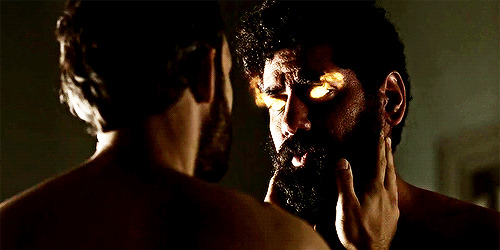
April Spink and Miriam Forcible from Coraline (couple.)
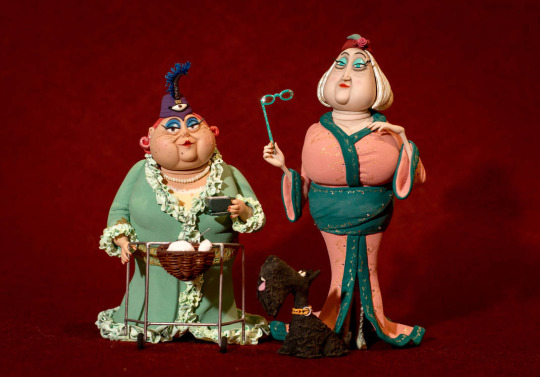
Angela (Lesbian).
The character Neil Gaiman created for Spawn is Angela. Angela is now owned by Marvel. Angela is a lesbian in a loving relationship with a transwoman named Sera.
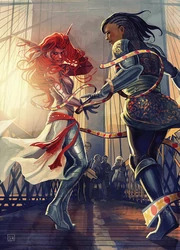
Salim and The Jinn from American Gods (Couple).
This relationship got nominated for a GLAAD award.
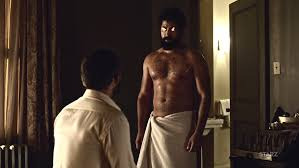
Sam Black Crow in American Gods (Bisexual)
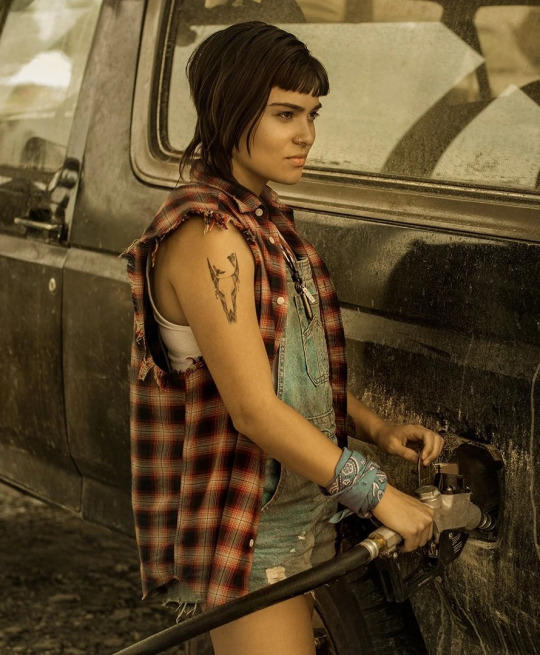
Snow White (Lesbian)
Snow White (Yes, the fairy tale character) is the lesbian protagonist of The Sleeper and the Spindle, which is a sort of crossover fanfiction of Snow White and Sleeping Beauty that Neil Gaiman wrote as a short story.
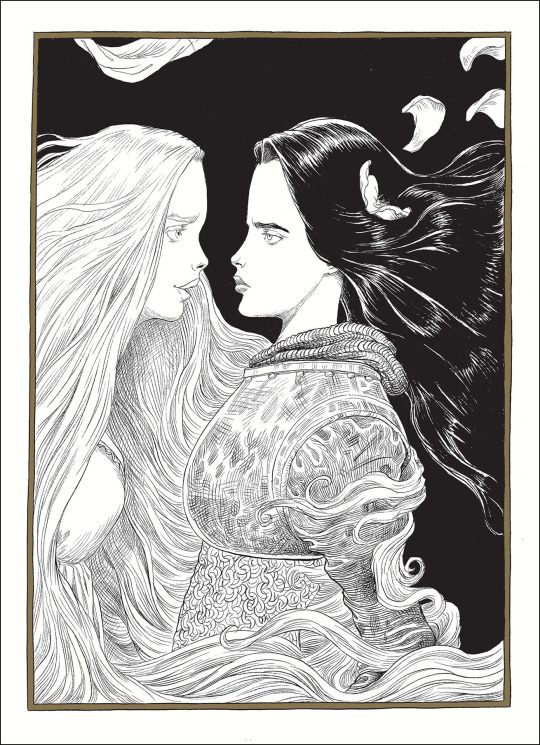
Captain Shakespeare in the film adaptation of Neil Gaiman’s Stardust (Gender nonconforming.)
His sexual preference is ambiguous but he loves feminine, soft, and pink things including womens clothing, hairdressing, and theatre. He also leads a band of cutthroat pirates who follow him loyally so there is that.
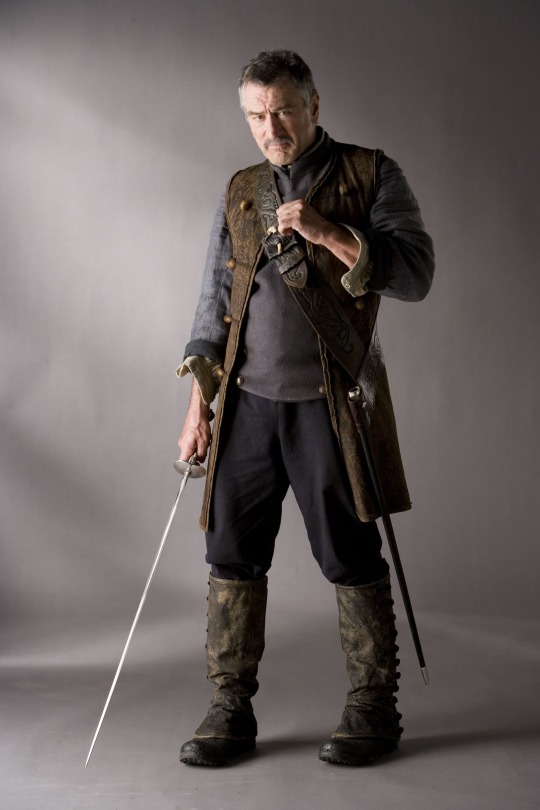
Loki (Loki)
There’s Loki in Neil’s book on Norse Mythology. Loki also appears in American Gods and The Sandman.
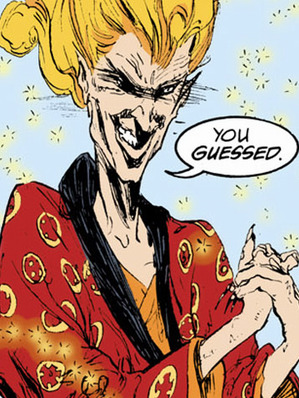
There’s also quite a few LGBT+ characters in Neil Gaiman’s Sandman, which include (but are not necessarily limited to):
Paul and Alexander Burgess (male couple).
It should be noted that Alexander and Paul were clearly in an open relationship (Polyamorous?) in the 1960s (With Alexander Burgess likely being panasexual) and they are now exclusive to each other by the end of Sandman: The Wake.
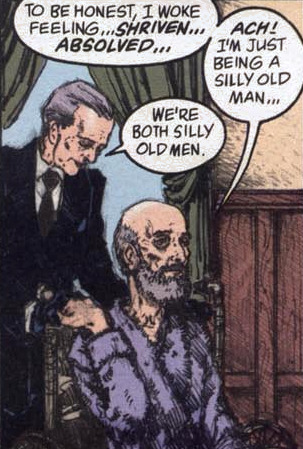
Judy (lesbian).
Judy was, unfortunately, phyiscally violent with Donna and it cost her the relationship. Judy died along with several other character at a diner when John Dee (Doctor Destiny) got a hold of Morpheus’ dream stone.
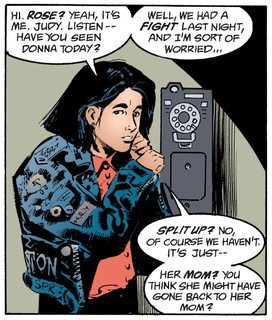
Donna AKA Foxglove (lesbian).
Donna is Judy’s ex-girlfriend but she ultimately found happiness with Hazel.
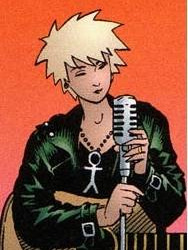
Hazel (lesbian).
Hazel had a one night stand with a man that resulted in pregnancy. She did not really enjoy it and now she and Donna (Foxglove) raise the baby together after having overcome many relationship issues. The baby was named after Wanda (the transwoman character). Since the baby was a boy they named him with Wanda’s deadname to remember her (Personally I think Wanda should have just been his middle name. Wanda hated the name Alvin).
It should be noted that Donna and Hazel’s love story (which starts in Sandman: A Game of you) got a spin-off comic called Death: The Time of your Life and that comic won a GLAAD award for representation in the mid-90s.
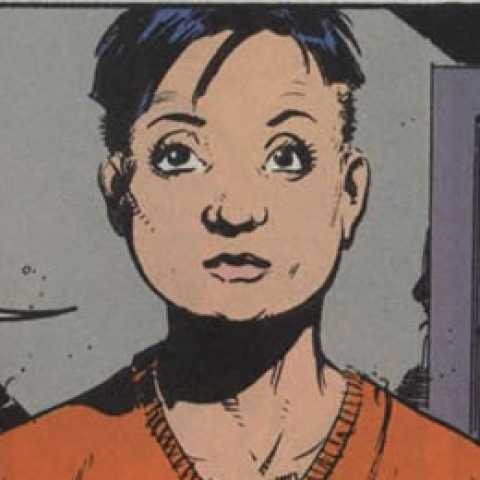
Cluracan (Bisexual. Possibly panasexual by modern standards.),
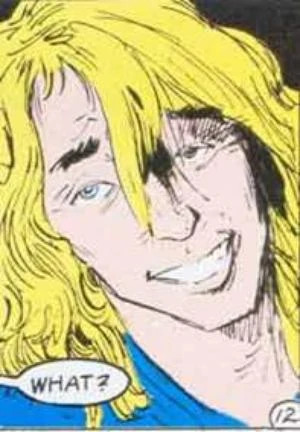
Wanda (Transwoman).
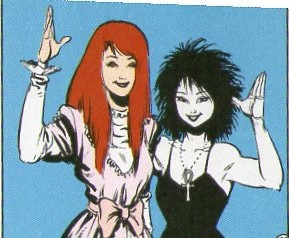
Desire (Genderfluid and panasexual).
Desire is the living embodiment of desires, good and bad desires. One moment they might want your death, the next they’re helping save the universe. Desire can be male, female, both, or neither at will.
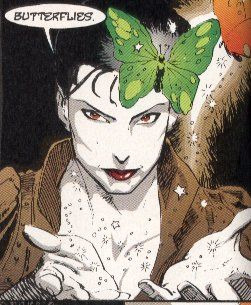
The Corinthian (gay),
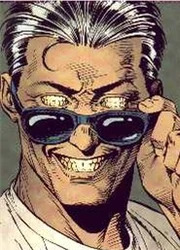
John Constantine (Bisexual.)
Though not originally created by Neil Gaiman he was written by Neil Gaiman in a few stories. Including his appearance in Sandman.
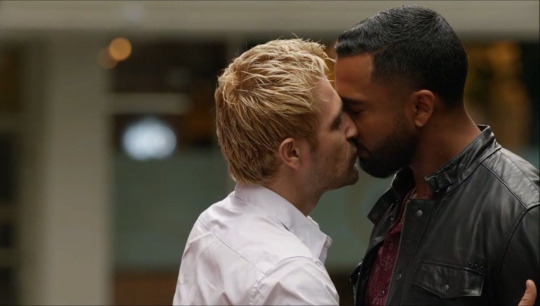
Lucifer Morningstar. (Complicated.)
Lucifer Morningstar (like all of Neil Gaiman’s angels) is depicted as having no true biological gender in both The Sandman comics and in Lucifer’s own solo comics. Lucifer presents as male and uses male pronouns. He self-identifies as male but many other angels don’t really consider themselves as male or female despite how they present themselves.
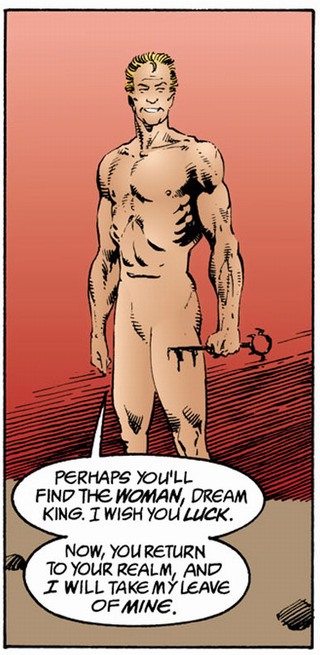
In the TV adaptation of Lucifer he is portrayed as having male and female lovers. It should also be noted that in the comics Lucifer was physically modeled after biseuxal rock star, David Bowie.
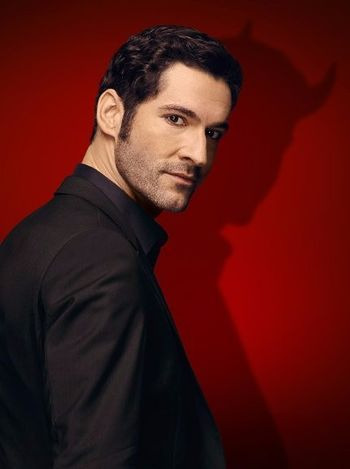
Mazikeen (Female identifying. Bisexual)
Mazikeen is a female-identifying demon portrayed as bisexual in both the TV show Lucifer and in Lucifer’s spin-off comics. In Neil Gaiman’s The Sandman she was Lucifer’s lover.

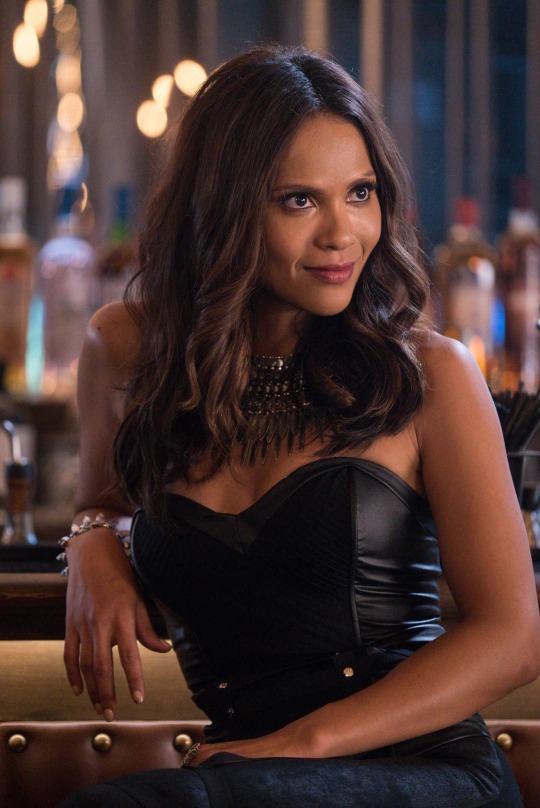
Eve (Bisexual)
Eve appeared in Neil Gaiman’s Sandman and in Lucifer as well as American Gods. In the Lucifer TV series she is portrayed as bisexual.
Note: Eve can change her age and appearance at will. Sometimes she’s young, sometimes she’s old. Sometimes she’s middle aged. And though she’s often appeared as white (such as in Sandman), she is black in the newer Sandman Universe comics, and in Good Omens.
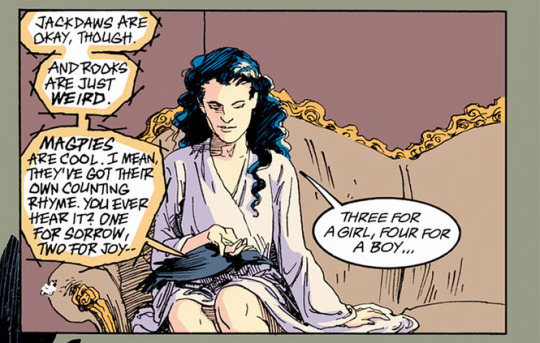
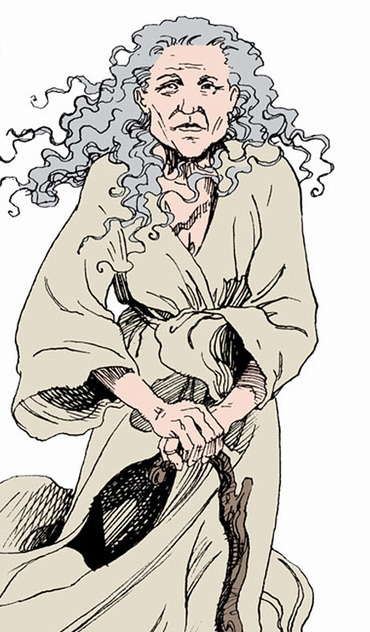
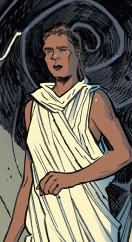

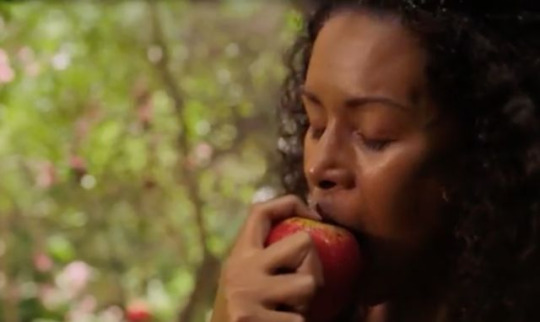
Various angels. (Diverse)
This one is a little complex. Many of Neil Gaiman depictions of Angels do not actually identify as male or female though many of them present as male.
Anatomically they are without gender unless they will it to be otherwise. Many of them have taken male and female Earthly lovers. You can see Lucifer depicted without physical gender in Neil Gaiman’s The Sandman, and other angels depicted similarly in the Lucifer solo comics that spin-off from Sandman.
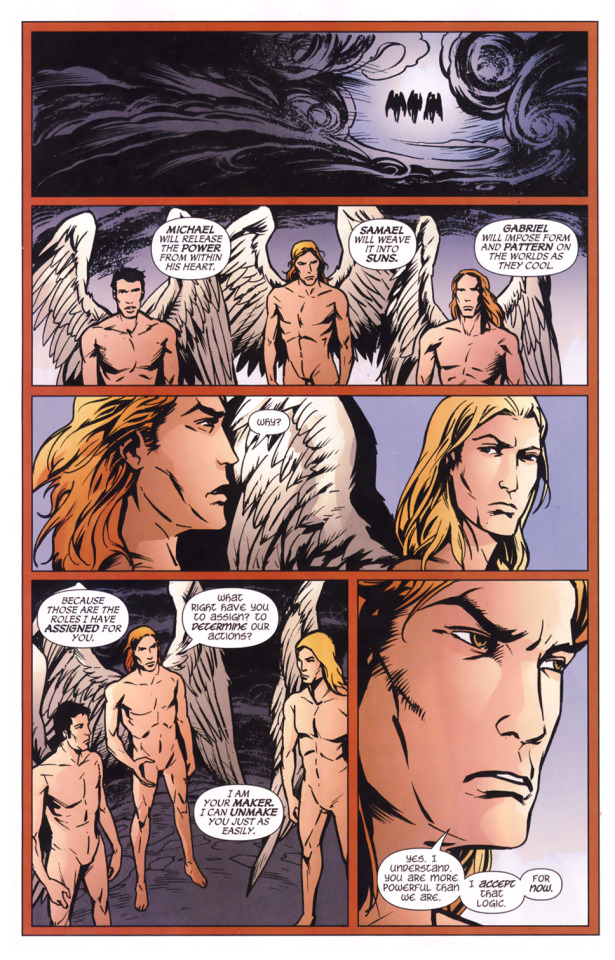
Pollution from Good Omens (Non-Binary)
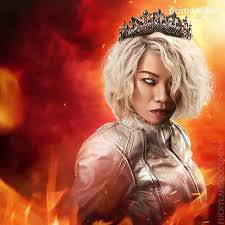
Aziraphale and Crowley in Good Omens (Couple. Demi panromantic celestial?)
Neil Gaiman does not personally view Aziraphale and Crowley in Good Omens as gay because they only present as male but aren’t truly male or female by nature. He has also said he does not view a male and female presenting angel couple as straight either for the same reason. He has said “I never said they are not queer.” just that he wouldn’t use the word gay for them.
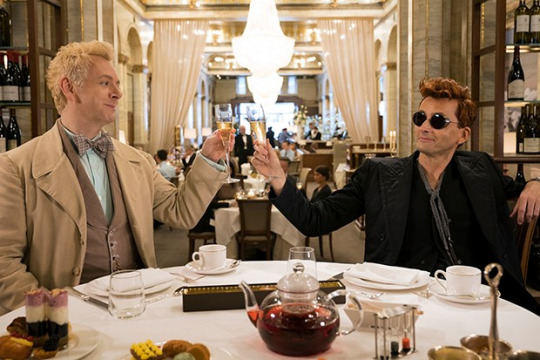
I know that’s not all of them but there you go. A list of LGBT+ characters created by Neil Gaiman.
And before I get a stupid hate-DM about how Wanda is “transmisogynist” because you read a Mary Sue article by someone who doesn’t understand context, understand this. There was no Trans representation when Wanda was created. She can’t follow a stereotype. The stereotype didn’t exist yet. She had not medically transitioned and ask yourself if you find her problematic just because she isn’t the conventional idea of feminine in her bone structure and height (Something even cis women have to struggle with). Yes, Wanda died but it was to show the cishet readers of 1992 that her soul was always that of a woman. There are still people today (even some Trans people) who don’t think you really count unless you fully medically transition. Wanda was scared of surgery but that shouldn’t matter. She was always a woman and that was the point Neil was trying to make.
Yes, Wanda’s family was transphobic. They were supposed to be seen as transphobic. Also Thessaly AKA Larissa and George are NOT supposed to be seen as good people. They are supposed to be seen as Transphobic. Thessaly is a pretty horrible person in The Sandman comics. She’s selfish and kind of homicidal. She represents the cold, self-absorbed immortal Morpheus used to be like. And before you try to argue “Just because Transphobia is real doesn’t mean Neil has to depict it!” (and yes, I’ve been given that argument while defending Neil Gaiman) ... Before you argue that, I want you to know something.
A Transman friend of mine was deeply moved by Wanda’s story because he went through similar. His parents still deadname him and misgender him on birthday and holiday cards and gifts. They never disowned him but they want to pressure him to “realize” he’s a woman. When he saw that Wanda went through similar, especially at her own funeral, he no longer felt so alone. Wanda may well have saved his life. So yes, I will defend that “problematic” character who died nobility and who was used in the early 90s to teach cishet readers that Transwoman (medically transitioned or not) are still women.
Also, Neil is NOT accountable for how the story was drawn. He’s not the illustrator. So stop using the artwork to claim he’s homophobic. A comic book writer essentially writes a script and then it is up to the illustrator to draw it as best they can. By the way, the illustrator of Sandman: A Game of You (Where Wanda came from) was Colleen Doran, who was nominated for a Gaytastic Spectrum award in 2001.
Stop looking for reasons to hate one of the only men who has been trying to give the LGBT+ community representation since the 1980s.
#Neil Gaiman#LGBT+ characters#Gay characters#Gay representation#The Sandman#Lucifer Morningstar#Good Omens#American Gods
1K notes
·
View notes
Text
ok so this us gonna be incoherent af but i've had revelations; i know i always talk abt my types n shit but i actually did have a serious sit down w myself to figure out what kind of person i actually want to date and for the first time i finally was able to come to terms w the fact that i actually dont really like cis guys that much unless they're gnc. the only cis boyfriends and crushes i had truly good experiences w were the same guys i used to trade clothes with and admire ourselves in drag together. the main reason i felt so comfortable w my ex was because when we started going out he liked to shop w me for makeup n he'd try stuff on. and it sounds like a weird kink thing so i always felt gross abt it but the more i thought abt it these past few days the more i realized that i cant be w a cis guy who hasn't explored his sexuality and gender and completely understands why i like to present fem sometimes. this all basically came about when i realized i am in fact bi with a preference and do like women but don't date them because i'm afraid of cis women and i don't want to seem like a creep for only dating trans women. my experiences dating cis girls were just as bad as my experiences with cis guys but there were almost no good experiences and the only good girlfriends i had ended up being trans dudes, genderfluid, and nonbinary meaning that was just another example of me feeling more safe and comfortable with other trans and gnc people.
it should not be this hard and scary for a nonbinary person to say "i don't want to date cis people unless they fully understand and preform gender nonconformity" or something like that. i feel like that should honestly be a given at the end of the day considering how people like me are treated in the dating scene. and like i've been hearin this stuff for years like "oh yea i see where ur coming from and feel it completely" while simultaneously forcing myself to like cis men when i clearly wasn't into it. and in the case of that ex who was exploring in the beginning, the thing about guys who dabble with makeup and shit but are more masc for the sake of their ego and reputation is that they have a lot of internal shit going on and will fluctuate between acting like they normally would and going several month long spans of macho bullshit to makeup for the one night he let you do his makeup and watched to wong foo together. when i say i want a cis guy who preforms gender nonconformity i mean someone who's as open about it as i am and doesn't have some stupid fucking hissy fits because someone might think he's not straight when everyone already knows he's not like ?? get a grip dude, i know the homophobia runs deep, i wouldn't be dating guys like you if it wasn't, but why must i be the one to receive the brunt of it as if i of all people don't understand the struggle of experiencing manhood in a manner that isn't traditional in a world where being different like that is seen as either an affront or a statement like???? and for that reason if i date another cis guy he's gotta be where i'm at or at least close as far as the self discovery thru presentation thing goes because i can't be there to hold a man's hand over his fear of wearing lipstick in private while i'm over here holding in my piss for six hours straight before i can find a gender neutral bathroom to safely relieve myself in. and as for cis women i swore them off a while ago due to too many of them using me as an experimentation tool or tried to convince me i'm just confused and butch. cis people are fucking terrifying, i've almost only had experiences like that save for the few trans and genuinely gnc people i was fortunate enough to meet as eggs. why has it taken me seven years of being out and proud as trans, understanding why trans and gnc people actively prefer dating people like them, being miserable with "traditionally" masculine cis men, and outright afraid of cis women to actually muster the strength to denounce 95% of all the cis people i could ever date as potential partners for my own fuckin sanity and safety?? fuck society for the way it ingrains the false importance of "real men" into the public psyche and fuck all the pieces of shit who actively convinced me it was a failing on my part for being so "discriminatory" towards so much of the population as if the only cis people who dated or showed interest me after coming out were either weird abt it, acted like they were my savior, or outright disregarded my gender. like no shit i'd rather be with someone who's more like me. fuck everyone who ever made me feel bad or gross for that.
i can't be a fucking chaser, meghan, i'm fucking trans and afraid of cis people, you ignorant WASP in training.
4 notes
·
View notes
Note
hi. I'm questioning my gender. I used to identify as cis-female, but I keep wondering if I might be more like female-aligned nb. I definitely don't feel male at all, but I'm not 100% comfortable with the social construct of what a woman should be like. idk if I'm nb or just cis, but not the stereotypical woman. Also I'm bi & way more attracted to female & female-aligned people or male people who possess stereotypical female traits, like sharing feelings etc Do you have advice or reading tips?
gender is so difficult, nonnie. it sounds like you are struggling over whether your identity is "gender nonconforming woman" or as you said "female aligned nonbinary person". ultimately i think the only way to find out for sure is to just try some labels on for yourself for a time and see what feels best. if you have supportive friends, you can ask them to subtly change their language around your gender (ie using they/them pronouns) and see if that makes you happy. i feel like thats really when most of us who are trans really figured out or realized, when we started experimenting & found out how happy it made us to hear ourselves referred to as our actual gender.
a few things you mention though does sound like some internalized misogyny. you dont need to be the stereotype to be a woman. this is not to say that youre not nonbinary, but that i think its something important for you to consider as well. womanhood isnt confined to what cisheteronormativity says it is, & if you dont fit that, that doesnt necessarily mean youre not a woman.
i think it might be helpful for you to look into writings on deconstructing gender. judith butlers work on gender as performative i think might help if you have access to it. ive also heard a lot of good things abt the book "stone cold butch blues" i havent read it personally yet but ive seen a lot of ppl both cis & trans cite it as helpful & very enlightening to them re their own gender.
i hope this is a little helpful to you nonnie. Im a trans man and ive definitely taken on many labels for my gender prior to figuring myself out so just know there are many different identities out there and you may have to go through a few before you figure it out and thats okay ! :)
Wes
EDIT: lol I was typing at the same time so I’ll just copy paste what I wrote
I have gone through asking myself exactly these questions so I’ll pass on the best advice I could ever have read at the time. I was looking at the blog @trans-mom and someone asked her a similar question to this and she said something like ‘cis people don’t question their gender’ and it was like a lightbulb went off in my head. I think that I’d been afraid that I’d be wrong about not being cis, that I would be infringing upon a community that I wasn’t really entitled to be a part of and that I couldn’t claim to not be cis until I was 100% sure. In a way those fears were very similar to how I first felt when I started to question my sexuality (and how many of our anons here seem to feel too).
But once I realised that cis people don’t wonder if they’re cis, I immediately felt like I was allowed to identify as ‘not-cis’. Which I did at first, literally just ‘not-cis’. And that was a huge weight off my mind which then freed me up to explore the trans/nb community and try out various labels and genders without feeling like I was encroaching on someone else’s space.
So I guess my advice to you is don’t worry about whether or not you’re cis and just let yourself explore as much as you need.
Max
5 notes
·
View notes
Text
I'm A Nonbinary Girl.
Tw: mention of transphobia and depression
Hey guys, obligatory coming out post for wrath month.
I want to be honest with all of you and say I'm a nonbinary girl.
I'm autistic, so I already feel some disconnect with my assigned sex because a lot of gender is social. Most of you already know that sense of gender is internal, so it would make sense that I'd feel this way when my brain is already non normative. A lot of autistic AFAB people like myself have shared similar feelings in their testimonies in the book Aspergirls by Rudy Simone.
I'm not sure if I always felt nonbinary. When I was really young, I loved being a girl. I wanted to be a princess and wear only dresses, and I didn't mind fitting into that box. For a while, I never thought about my gender. I was just a girl.
When I was 12, I realized that I liked girls. I had been bullied when I was younger, before I came out, because people perceived me as queer. I was terrified. I'd only recently learned that being gay was acceptable and not something to be feared, and I didn't know how to think of myself. My whole life I'd fit into gender norms and now I was the one thing girls weren't supposed to be.
I learned more about queer culture, about how people perceived women who love other women, and the summer before seventh grade I made a choice. I chopped off my hair and went into school with a pixie cut. Being seen as queer was my choice this time.
And I realized that I loved being seen this way. I loved being androgynous yet still feminine. I loved looking pretty but looking butchy too. It was the first real time I'd stepped out of gender norms.
In eighth grade and late seventh grade, I learned about nonbinary genders. I had never thought before that it was possible to have multiple genders, have none, or maybe even have one in between or even completely outside boy or girl. I met out nonbinary people there and unlearned a lot of really toxic and transphobic myths.
At first, I didn't really think their labels applied to me. But when I tried to picture my gender identity at the end of the year, if only out of curiosity, I saw it as a rectangle filled with mostly pink with a little purple on the bottom. A girl, but not quite.
That summer, my parents signed me up for a music camp. It wasn't just an ordinary music camp. It was specifically for girls and gender nonconforming people, and we learned how to play rock music in assigned bands. On the first day, we got lanyards with our name on it, and the leaders of the camp told us we had to choose pronoun buttons.
i don't know why, but I panicked. What was I supposed to pick? I felt uncomfortable using just she, but felt like a faker if I chose they. I ended up getting both buttons. It felt right for a few days until I turned it back into the staff when it stopped feeling right.
But that should've been the end of it.
i still had feelings that I was mostly a girl, but not quite. On occasions, I would see myself as fully female. I would be okay with only she, and knowing I was a woman. On other days, I felt more androgynous.
In ninth grade, the feelings kicked in again. This time, I had real dysphoria for the first time. During the first semester I tried to make my voice sound deeper and I wore clothes that made my chest less obvious. I didn't like my curves, or my femininity. I tied my hair up in hopes that I would look more masculine.
i thought for a while I might be a trans boy or genderfluid. Sometimes, being a girl was alright. But others, I couldn't stand it. Even then, I got those feelings. You know the ones. Almost a girl. But not exactly.
During winter break that year, I was really depressed. I wanted so badly not to be a girl anymore, but I didn't come out or commit to a label because I worried that I was faking. That I was only doing harm to actual trans and nonbinary people. That I was being cringy and that I was a girl looking for attention by feigning being trans.
My dysphoria faded, but when kids at my school asked for my pronouns I told them any would work. Sometimes my dysphoria would come back. Later that year, I realized I liked the label genderfluid best, and began to love my masculinity and my femininity. Strangely enough, I felt that I almost became more feminine because I hadn't really embraced that in a long time. On my masculine days, sometimes wearing a dress gave me the best feeling.
I came out to a couple friends, and began to look at more genderfluid pride posts. At the local queer pride dance, I made a button for myself. The genderfluid pride flag was the pattern.
At that dance, I encountered a demigirl. I'd met them before at a different event. They wore dresses and had long hair, but they used gender neutral pronouns. I liked the idea of that. Being femne, but not necessarily female.
I never did come out as genderfluid to more than a few people. Over the summer, before tenth grade, I decided again that being a girl was fine. I was cis, I told myself.
But someone in my family came out, or attempted to come out, as nonbinary. This person was not me. Some of my family reacted pretty badly, and told them not to use labels and that they were really cis and looking for attention. They thought nonbinary people were special snowflakes who just wanted to be better than everybody.They thought the whole concept of a third gender was too far.
I got really depressed again. I told myself that since I'd introduced that person to the possibility, it was my fault they were nonbinary and that it was my fault they had dysphoria. I should've been mad at some of my family members for being transphobic instead.
I got through it, and the start of the second semester was a lot better. A few months later, I started using they/them pronouns. I liked it. It felt right. I only really stopped because I got insecure, and the whole faking worry came back. Apparently I seemed pretty androgynous, because some boy called me an it on the bus. I told him I was a girl, but to be honest, I didn't mind.
At the end of the year, I was pretty much sure of what label I would use. Nonbinary girl. I'd first heard of it when Rebecca Sugar came out, and I was surprised that was something you could identify as.
i chose the label I did because I feel that I am a girl, but mostly. Like I'm a woman and another identity at once. My nonbinary identity is less pronounced than my feminine one but it's definitely there. You could probably call me bigender if you wanted to. There are times I fully feel like a cis woman, but most of the time nonbinary girl fits. I guess that technically makes me fluid or flux. I don't want too many labels, though, so nonbinary girl is fine. I don't like being called just nonbinary because femininity is still a core part of me.
I'm now 16 and headed to my junior year of high school. I don't plan on coming out to my family, but I will switch my pronouns from just she to both she and they.
I am a nonbinary girl. I am a lesbian.
This might change later, or I might decide I don't like to identify like this anymore. But this is who I feel that I am. I've spent so long feeling guilty, worrying that I was a trender, and being anxious about which label that I ignored my truth.
It's taken years to find, but here it is.
I'm a Nonbinary Girl.
#nonbinary#nonbinary girl#femme#enby#coming out#tw depression#tw transphobia#lgbt#Queer#lesbian#nonbinary lesbian#pride#my story#long post#text post#personal
32 notes
·
View notes
Text
“Rapid-Onset Gender Dysphoria” and Bad Transphobic Pop Science
Many people engaged in discourse on this website, especially with truscum, have probably encountered their concept of “Rapid-Onset Gender Dysphoria”. Those who have the fantastic shinigami eyes extension enabled and search for the topic will often find a litteny of red sites when you look for anything involving the term from sites that often spout anti-trans rhetoric and are constantly looking for pseudoscience to back up their beliefs.
“Rapid-Onset Gender Dysphoria” as defined by the official website for it (yes, really. Don’t click here if you’re triggered by transphobia) run by the transphobic parents of young trans teens, goes as follows: “A type of adolescent-onset or late-onset gender dysphoria where the development of gender dysphoria is observed to begin suddenly during or after puberty in an adolescent or young adult who would not have met criteria for gender dysphoria in childhood.”
There are obviously flaws with this, even on the surface level of just this definition, without looking at the actual study conducted itself (though we will get there, trust me).
First of all, you have to assume that you require gender dysphoria to be trans. There’s evidence quite to the contrary in that professionals and groups dedicated to assisting trans people agree that dysphoria is not a requirement for identifying as trans, and actual (read: not pop science) that has found that the brain is not sexually dymorphic and that there arent “male brains” and female brains”, that very few people actually regret transitioning (roughly .6% of trans women and .3% of trans men, please note the decimal and that both of these, when accounting for the fact that both groups only account for roughly half of all binary trans people, equal less than half of 1% of all trans people).
Pretending that evidence doesn’t exist, let’s pretend that the assumption that gender dysphoria is needed for being trans is correct. Even in that world view, this definition is poor and tenuous. When you describe “not having met criteria for gender dysphoria in childhood”, you are going with the assumption that the child didn’t experience and hide it very well out of shame. Or that they did express it and their parents dismissed it and continued to dismiss it throughout childhood. Or that the child did not force themselves to perform hyperfemininity or hypermasculinity in order to try and “make it go away” in the same vein of a gay person forcing themselves into relationships and situations with straight people. Or that the child is not gay and gnc. Or that didn’t experience adolescent or adult dysphoria which the dsm-5 does define as legitimate experiences, as do MANY ACTUAL TRANS PEOPLE IF YOU TALK TO THEM, SOMETHING THE AUTHOR OF THE STUDY HAS FAILED TO DO.
Many trans people who experience dysphoria don’t experience it until they hit puberty and their body undergoes changes associated with the wrong kind of puberty for them. Which, for the trans children of the parents surveyed (yeah, we’re getting there, they didn’t actually survey trans kids), allows them to say “well you weren’t like this before!”
There is one, single study conducted with regards to “Rapid onset gender dysphoria.” Lisa Littman, the woman who conducted the study, isn’t even a professional in gender studies. She’s a fucking gynecologist and obstetrician (pregnancy doctor). This is not her field of study. Much of her research is focused on detransition and her coined “Rapid-Onset Gender Dysphoria” despite, again, no experience in those fields of study. She’s a cis woman obsessed with making trans people identify as cis again, or as “normal” by her standards. If she would have done actual research, she would have found just how few trans people want to detransition after transitioning in the first place, or how many people who do detransition are trans people, often trans women, forced to detransition in order to survive every day.
Beyond this, the study itself: where do I even begin.
I have defined Ms. Littman as coining ROGD, and that’s not quite fair. The actual people who coined it are well-known terf website 4wavenow.com, conservative website Transgendertrend.com, and YouthTransCriticalProfessionals.org which is an organization of conservative scientists (theres an oxymoron if I’ve ever heard one) who hide behind degrees while they churn out anti-trans propaganda. In fact, that’s what all three of those groups do.
Now, finally, with all that out of the way. Let’s talk about this study, posted in the non-peer reviewed journal of academic health.
First of all, as alluded to previously, it was conducted by talking to the parents of these kids, not the kids themselves. This opens up a whole host of things to talk about, and trust me - we will. It was a 90 question quiz posted on the three websites mentioned previously: 4thwavenow, transgendertrend.com, and youthtranscrticialproffessionals.org. So, the survey is already poisoned, placed on websites with deliberate anti-trans agendas, with no way of verifying who the fuck was taking that survey. So if Tammy Terfbangs, mother of absolutely no one, gets on 4thwavenow and sees that a ~super scientific survey~ about those evil 14 year old trans kids, there is quite literally nothing stopping her from filling it out. I cannot even begin to describe how shoddy the foundation for all of this is. Or if, per say, a popular terf blog linked to this, there’s quite literally nothing stopping dozens or hundreds of terfs from filling this survey out.
As a scientist, the methods in which she procured the “””evidence””” on anti-trans websites run by the parents of trans children makes me fucking furious. Imagine running a study about, per say, autism, and how sensory overload feels, instead of asking the autistic person, they asked the parents of the autistic person, and posting it on “TheCureForAutism.org” and “DontVaccinateEducate.Com” and then posting it in a shitty non-peer reviewed journal. Essentially, thats exactly what this is.
This idea isn’t even new. The WPATH standards of Care, published in 2011, hosted a section called “Phenomenology in Adolescents”. This section had the following to say.
“Yet many adolescents and adults presenting with gender dysphoria do not report a history of childhood gender-nonconforming behaviors (Docter, 1988; Landén, Wålinder, & Lundström, 1998). Therefore, it may come as a surprise to others (parents, other family members, friends, and community members) when a youth’s gender dysphoria first becomes evident in adolescence.”
The idea that the internet made your kid trans, the backbone of all of this, is just so ridiculous that the fact that I have to even talk about it is stupid. Many kids who understood they were trans when they were young but didn’t know what that meant and couldn’t put their identity into words. Fun fact, if you explain to someone a concept that they didn’t understand but felt before, they might in fact realize that it applies to them. The fact that resources are now available to them to give them information about their identity, and that trans people are more visible now than a decade ago when this generation of trans and nb people were growing up, is a good thing.
Besides, considering just the quantity of shit like “transgender people DISPROVED by ben shapiro” and “NONBINARY CRINGE COMP #400000000000000000″ available on youtube being fed directly to toddlers with ipads, it’s not like all exposure to trans people has been framed positively, nurturing, or encouraging, and it would be beneficial to talk about the ways in which this is going to affect the trans and nb people who will be around a decade from now.
There’s so much more I could talk about here, but I don’t think I need to. Instead, I will link to this amazing article that was the backbone of much of what I wrote. The author is a bisexual trans women with a degree in biochemistry, she knows what the fuck shes talking about.
20 notes
·
View notes
Text
Warning: Mention of dysphoria, self harm
Sexuality and gender are confusing. Even after years wearing one label you may find it's not quite right, other times you have to face the fact that you don't conform to the "standard." I've recently realized- Or more accurately; admitted- That I am not cisgender. As I have mentioned before, I've been closeted to all but a few people my whole life. Sexual orientation (or lack thereof) was loud and demanded to be dealt with, but I feel like gender was quieter.
We live in a society where gender isn't questioned. We don't sit around and talk about our genders like we talk about sexual orientation. If the default for sexuality is to assume straight until proven otherwise, this is ten times more true for gender. It's not just that we don't talk about it, we actively avoid questioning it or bringing it up.
I'm reminded in this thread of a trip my family took to Key West in Florida, USA. Key West is famous for its nightlife, music, and most of all; drag queens. Cross-dressing is so prevalent in Key West that it almost becomes more of the norm than the minority at night. My parents took me on a walk down main street and I saw many new and exciting things. Women wore whatever they wanted, some barely anything at all. Men openly wore skirts and dresses, often decked out with heals and make-up even when they weren't in full drag. All through this wonderful experience, however, I remember my mom reminding me over and over "These are just men having a good time. Some are role playing as characters who will sometimes hit on guys, but most of them are actually straight. Even if they wear dresses and big earrings they are still men." In the words of John Mulaney, we don't have time to unpack all of that.
What I'm getting at here was the strict reminders and clear message that even when men did feminine things, they were still men. (If only she had this stance of trans men) At no point should you question their gender or sexuality even if they were making it clear they didn't fall into the heteronormative societal roles. I'm also reminded of a crossplaying panel I attended hosted by an AFAB non-binary cosplayer. They mentioned that even wearing a full beard people would still refer to them with she/her pronouns. People stuck to the role that they thought they belonged in, even with an obvious outward sign that they were nonconforming. Both of these are examples of this unwillingness to open the discussion at all. People are so afraid of stepping outside of the binary structure as they understand it they will willingly misgender a person.
With a society that works to ignore binary-non-conformity I feel like gender exploration becomes taboo. It was much easier to ignore my own discomfort than confront it, especially when I had no idea what else there was. Experimenting with labels and pronouns is really only possible anonymously online until you are pretty sure of your place, and when you are ready to bring it up it's a big deal. The fear of people saying your feelings and experiences are "just a phase" can make it really scary to experiment in case the label or pronouns don't fit.
What the hell is actually wrong with phases, anyway? Sure you are going to grow out of them, but that's natural. You can't teleport from point A to point Z, there are a lot of places to go through in between. I had a phase of being a child, but I became an adolescent and eventually an adult. (by age at least) If I tried to buy alcohol with an underage ID it wouldn't be legal, even though my age is just a phase. See, we need phases to grow. Everything has phases. Until we as a society accept that; experimentation is going to remain terrifying.
So here I am. Living on my own. Out from under the roof that forced me to stay closeted, but rather than feeling free I felt more trapped than ever. It was like loosening the lid on a shaken soda, more space just increased the pressure. It wasn't the first time I had experienced dysphoria, but it certainly was the worst. There was one day where I couldn't manage to put on clothes for hours since my entire wardrobe reeked of binarism. I wanted to cut my hair off, all of it at once. I wanted to cut myself. Suddenly the quiet discomfort that had been growing inside of me for years was very loud and very present. I was forced to use introspection, something I had procrastinated for far too long.
Why, though? Why did I avoid confronting the topic until it became life-threatening? It's not that I am afraid of LGBTQIA+ topics, I already went on the whole journey of realizing I was asexual homo-romantic, which is definitely not one of the garden variety labels. I have many friends who are trans and/or non-binary, as well, so it's not like I was unfamiliar with the subject. I think it really boiled down to two problems, one internal and the other external.
First, I didn't feel like I deserved to have a "special" identity, basically I told myself I was close enough to Cis to deal and therefore didn't need to make my problems other people's problems by talking about them. Dumb, I know, but this type of thought process happens when you struggle with anxiety and self-hatred.
Second, and possibly more importantly; I was afraid to go outside of my gender box. I was scared that other people would call me a snowflake. I rationalized that I would never pass as anything other than my assigned gender, and I reasoned that my family would be confused and disappointed in me if they found out. The same reasons I struggled with my Ace label, but with a new and fabulous seasoning of "my gender identity doesn't actually affect my life that much." The hypothesis obviously being disproven by my own mental health problems.
I thank God that I do have supportive and accepting friends, but my main concern after finally admitting my gender situation to myself was still "am I confident enough in this to tell other people? Could it be a phase?" Sexuality is hard and gender is confusing. The lack of ability to comfortably experiment is what makes self-exploration so frightening.
You would be bored to tears if I detailed the amount of research I had to do just to find reliable information on gender labels. This not mentioning the self-reflection required to determine how long I had felt disenchanted with binarism and what parts of my identity were direct results of my Asexuality. It took a lot of painful time. Painful? Yes. I felt anguished, out of place. You can wear shoes that are the wrong size for a short amount of time but if you wore them all day they would start to hurt badly. Longer than that and they would reach the point where they were unbearable to wear and you were unable to walk. I had reached that point, and I couldn’t wait to slip into a better fit. The more shoes I looked at, though, the more I thought about my aching feet, and the worse I felt.
Alright, alright. I have danced around it for a long time, I'm sure you are dying to know what shoe- I mean gender- I picked. To continue using the dead analogy with the shoes I realized I was better off barefoot. The only labels that felt okay were genderqueer and agender, agender being the more comfortable of the two.
I honestly don't know at this point if that's always how I will identify. Also, the finer details of pronouns and names are difficult. I like my name, it's not my fault it belongs to an arbitrary binary system where certain syllable combinations are code for which genitals I had at birth and are associated with assumptions about my gender, personality, and upbringing. Pronouns are weird, too; at the moment I'm just going with whatever people assume since I have no kinship with any particular set, however, this still feels uncomfortable. Gender is an adventure just like everything else in life, and I haven't reached the story goal just yet.
Sexuality and gender are still confusing, but I think healthy exploration and education can really improve the experience. I don't know right now if my labels are permanent, but that's okay. Everything has phases, even the moon, and everything has ebb and flow, even the ocean. I'm learning to accept myself a little more all the time.
#gender#questioning#questioning my gender#dysphoria#gender dysphoria#agender#asexual agender#aspec#personal#self harm#trigger warning
2 notes
·
View notes
Text
Content warning: some spoilers, reference to author’s weird obsession with young trans girls’ genitalia and to sexual assault committed against main character
Basic boring and bad things about this book include:
⁃ all dialogue scenes are long and bland; there is no banter that is funny
⁃ The same points are hammered on again and again for hundreds of pages : again, Lily’s dad thinks hormone blockers are too expensive and she should be a boy. Again, Dunkin is afraid of his mental health issues. Again, Lily is called a slur and is upset. Again, Dunkin wishes he were braver than he is. There isn’t a lot of dynamic action.
⁃ Lily gets deadnamed in the cover flap of the book and in the family tree in the front of the book
⁃ Parents are one dimensional, either harmful or benevolent
⁃ Tween children never have violent or angry thoughts unless they are bullies, and politely respect adult rules
⁃ There isn’t any payoff to Lily standing up for what she believes in re: her tree, not even solidarity from other activists, sending kids the message that it is meaningless to protest things that are wrong
⁃ Dare, Lily’s best friend, is one dimensional and never emerges as an independent character, which sucks more because Dare is black . Dare only acts as an emotional support for Lily. Her own motivations and passions never fully emerge. She uses spurts of AAVE once in a while but her lived experiences as a black kid in south Florida do not come up.
⁃ Something that annoys me all the time in melodramatic kids’ books like this is where characters say something and then repeat the same thing with more emphasis on a separate line in a punchier way, such as : “(line break)I don’t say anything. (Line break) I never say anything.” This happens what seems like once every two to four pages. It disrupts the flow of the narrative
⁃ Kids lack agency and their resolutions come from adults changing their behavior , which doesn’t leave young readers much to go on in dealing with similar struggles
Aside from all that :
There are many things about this book that do more harm than good in terms of impact to the groups the book is supposed to advocate for. These can be roughly sorted into Trans Stuff and Mental Health stuff. First, let me get into the trans stuff.
First , technically speaking: a thirteen year old seeking hormone blockers will typically need to suffer through several quite arduous conversations with parents and psychologists and psychiatrists before accessing them. With the dawn of informed consent practices, this has changed a little, but the questions that Lily’s kind psychologist ask her barely touch the basics of what trans kids typically are asked to talk about in therapy. Additionally, we never see Lily or her parents learning any more details about her hormone blockers at the endocrinologist—essential details, such as the fact that their effects are reversible, that their side effects aren’t known to be substantially negative , that there aren’t yet many studies on their long term use. Even if Lily didn’t understand all that info, as a trans kid she would absorb at least a little of it. Additionally, I feel like her parents would talk to her more about their understanding of what trans people are or go through, with articles about detransition, etc —and Lily would counter with her own knowledge. The absence of any of this simplifies trans experience down far beyond even the most basic Oprah special and makes accessing hormones and blockers seem both easier and less involved /reflective a process than it actually is.
Another really major issue I have with this novel about an eighth grader is that Gephart seems obsessed with Lily’s body and specifically her genitalia. I cannot even count how many times the word “penis” appears in this book in reference to Lily, in what is otherwise quite a G rated book. Cis adults often fixate constantly on trans kids and their bodies and genitals and fertility in a way I find really creepy, and Gephart has continued this trend with an exuberance that makes me want to keep all young trans girls faaaar away from her. The fact that she has Lily undergo a demeaning public sexual assault from bullies in her class in a way that doesn’t at all serve the plot underscores how much Gephart is obsessed with young trans women’s bodies. While Dunkin also has issues with puberty, experiencing insecurity about his height and weight and hairiness, his sexual privacy is respected and we get no hint he even has sexual organs at all—I assume the cis characters in Gephart’s other stories get the same treatment. Meanwhile, we hear over and over again about Lily’s pubic hair, genitals, and fears concerning what will happen to them if she doesn’t get on puberty blockers. It is her main personal arc (seeing as the save-the-tree arc doesn’t start until a good 100+ pages into the text). While real young trans girls have a number of fears and passions having to do with school, hobbies, friends, etc , lily is almost completely absorbed by the author’s fetish for her body. She talks constantly about her “stupid boy chest”, her narrow hips, and a range of other body parts she hates and wants to alter. In a cis girl puberty book, this would lead to a conclusion where Lily realizes she maybe looks kinda cool as is, in the liminal state that is adolescence, but not here. Which brings me to another point —most trans kids never go on hormone blockers. They’re really expensive ! Parents who support their kids can’t necessarily afford this care, and many trans kids also come out after their first puberty. This book communicates, via Lily’s attitude and her mom’s attitude and everyone’s panic about Lily’s body, that non-puberty-blocked trans kids will have transitioned “too late” and be forever marred by hair, height, bone structure, etc. This perspective is a really ugly cis-normative one. It is based in the idea that trans people and especially trans women must look as much like cis people as possible, must know their intent from childhood, and must commit themselves to expressing hatred of their bodies and (violent) intent to alter them into something more socially pretty and socially acceptable.
What really makes trans kids safe is acceptance and support and emotional connections regardless of appearance and hormone desire/hormone access. Hormone blockers are Not bad, and I support kids getting them, but neither are they universal or necessary to live as a happy trans person.
Lily never experiences anyone telling her that in this book, and doesn’t meet trans women older than her who have had different experiences with transition trajectory who could advocate for her while also clarifying that Lily’s path isn’t the only one. This book is a cis mom’s vision of perfect medical transition —syrupy and gender-conforming and girlie and with a stamp of medical approval that ignores and disdains the experiences of trans kids and adults unable or unwilling to access early medical transition. It’s unnecessary and directly harmful. Trans people usually experience dysphoria, but many of us learn through practice and community that the ways we are special and unique are beautiful, that our medically altered adult bodies are cool, and that we don’t need to obsessively conceal our differences in order to be gorgeous and lovable. Gephart is determined to undermine such efforts, which sucks for cis readers too. I think we should all realize by now that standards of bodily appearance that oppress trans people also oppress gender nonconforming cis women and girls and nonconforming boys (at one point lily thinks : “I am not a fag, I am a girl!” What does that say to gay boys and butch girls?)
Second : mental health stuff.
Just as Gephart wishes to do away with the complicated other-ness of being trans, she also skips over the factual realities of being a young teenager with bipolar disorder. For one, diagnosis of bipolar in a thirteen year old is pretty rare. Having bipolar that young is also usually traumatic, in addition to being precipitated by stressful events—such as a death. Dunkin’s freakouts are understandable, but the narrative treats them as a major problem without explaining why and treats Dunkin’s bipolar as a frightening and slowly encroaching monster rather than a set of symptoms rising out of genetic predisposition plus life circumstances and maladaptive coping mechanisms. It dehumanizes him to treat his bipolar like this. Dunkin naturally resists the heavy level of control exerted over him by doctors —scenes of him skipping medications out of a sense that they hold him back are among the most realistic in the book. Similarly, the lack of communication and punitive attitude of doctors is also something many teens encounter when seeking care for mental health issues. These things could be addressed in text by Dunkin having a conversation with his mom and seeking a psych that makes him feel more comfortable or working on his own level of trust in her and her affirmations of what reality is. But they don’t talk. Gephart would rather teens blithely submit to treatment from doctors who call them the wrong name and be adequately sedated for the comfort of the adults around them —even though many antipsychotics and mood stabilizers don’t work well or work long term for large portions of the population and can cause negative side effects, and finding the right drugs requires hearing feedback from patients and often several trials of different drugs plus behavioral therapy etc.
A major issue for me is that Dunkin’s father —a man who also has bipolar—is cast as almost wholly incompetent and crazy and Bad with a capital B as a parent. Likewise, Dunkin’s mental illness is treated like a dark mystery for most of the book, and its slow reveal becomes an exhibitionist sort of revelry in how crazy he is acting —which isn’t how books about bipolar teens should treat this issue. Mental illness being the bogeyman makes people more afraid to get diagnoses or deal with symptoms and makes it easier for people to deny that there is a problem if they have less extreme symptoms.
While bipolar and other illnesses can ruin lives and cause families to hurt, it sucks that Gephart chooses to frame mentally ill adults as both totally irresponsible and totally doomed with no nuance and frames the medical industrial complex as a stern but ultimately benevolent force in Dunkin’s life that protects him from himself. Psychiatrists can help people access needed care, but just like Dunkin’s psych, they can also alienate and scare people. Especially for teens, psych facilities can cause trauma on their own, especially for kids of color or kids dealing with other issues like grief. They are sometimes the least of all evils, but Gephart treats doctors like saviors. Kids growing up with bipolar need to know adults who struggle with the same symptoms and to practice self reflection and engagement with communities of mutual advocacy and need to understand the various factors that can exacerbate symptoms and interrupt their lives. They don’t need to be told to shut up and take the pills doctors give them and to trust people in high places. They get that from other people.
Basically, Gephart has stuck her nose into two issues that do need representation but which she doesn’t adequately understand, and the result is patronizing hogwash in book form . Skip !
4 notes
·
View notes
Text
The months since elul 5777 has been a hugely transitional time for me for so many reasons. I’ve been meaning to write about this since, well, late elul, early tishrei but I never had the energy to do so. I broke this up into chunks for easier reading but this is still quite an essay…
I know this is long but please like if you read even a part of this and if you have any insights or advice to offer me, my askbox is open and I’d love some support of any kind!!
Children
I always wrote off the idea of having children, even to the point of being one of those people who thought it was funny to be somewhat hostile towards kids. I did have some legitimate reasons for this, mostly sensory issues, being that I’m autistic and am sensitive to many sensory experiences; however, most of it was me just stubbornly holding onto a general distaste for children. Through the course of my retail job, I found myself more and more warming up to the kids who came into the store to the point where I would go out of my way to make faces and wave at babies at the expense of doing my actual job (not to worry, my job was literally completely ineffective). As I realized just after the High Holy Days began, I didn’t just not hate children anymore, I liked them. I actively like and desire to have children now.
If someone had asked me if I really thought I never wanted kids, I would pretty adamantly say I didn’t, though sometimes I’d admit that I could see myself maybe adopting one child in the future. Now it actively pains me that I don’t have children. Plural. Children. My only image of my future self is me, happily married and raising at least 3 or 4 good Jewish children.
I’m only 23 so I know that I’m not expected by secular society to have kids but seeing my more observant Jewish cousins around my age pursuing marriage really gets me down a lot of the time. I want nothing more right now than to marry a nice gay Jewish man and adopt a few kids. This leads me to my next sections…
Career goals
I never settled on one single thing I wanted to do with my life. I was one of those kids who, probably due to being autistic, was always getting deeply invested in something and then flitting off to another after a couple months. For the last year or two I did have a decent idea in my head that I wanted to get a Master’s of Library and Information Science degree and work in a library or archive. I’m good at that kind of work. It allows me to be quiet and a bit neurotic about my workstation because I’d largely be working alone, away from the general public and most of my coworkers.
After my graduation, my mom and grandma suggested that I consider going to law school. I agreed to at least take the LSAT, which I will be doing in February and oy am I nervous!! My mom, who went to law school, says that she thinks I’d be great at it, that my mind is so well-suited to that type of thinking. I don’t disagree with her but I also can’t imagine myself doing anything with a law degree.
In fact, I can’t imagine myself doing anything in the future. People think I’m joking, but I really do just want to marry someone with a steady, well-paying job and be a house-spouse. I have a deep passion for learning but I have no passion for an actual career that comes along with any path of study. In a perfect world where my mental illness didn’t destroy my ability to read, I would love to go get an MLIS and/or a law degree. I’d even consider going to a yeshiva and studying Torah, Talmud, contemporary Jewish issues, all that. But once I’m out of school, I have no clue what I’d do besides sit at home with all that knowledge swirling around in my head.
Education is never a waste in my opinion, but also formal education is expensive and I’d never be able to afford it without having a prospective career in my future to provide the income for paying off the student loans.
Gender
I never understood the concept of gender. All I know is what language I’m comfortable with, how I like dressing, and what I want my body to be. I am AFAB (assigned female at birth) and I medically transitioned through hormones, chest surgery, and a hysterectomy. My pronouns are they/them or he/him. I am now legally male with a traditionally male name. On most days, I enjoy wearing skirts though I do occasionally choose to wear pants. I could never be cis-passing unless I stuck with wearing pants all the time, which would make me very uncomfortable. If you asked me to get dressed without thinking about it at all, my first choice would be to throw on a skirt, t-shirt, and cardigan. It’s comfortable, psychologically and sensory.
None of this changed during elul 5777; what did change was how my gender and my Judaism were connected. Before, they weren’t. Now, I am working on becoming shomer tznius which involved a major overhaul of my wardrobe, particularly the skirts and dresses. I got rid of almost all of my short and revealing articles unless they could be easily layered and bought a lot of long skirts, three quarter sleeve shirts, cardigans, and other tznius layering essentials.
When it comes to my religious observance, I mix and match though I do mostly connect with the mitzvos for men. In shul and at home, I prefer not to light the shabbos candles if there is a woman who would be able to do it instead. I wear tallis and tefillin to daven and I leyn torah. But I also enjoy occasionally wearing a tichel and being the one who cooks for shabbos, plus the aforementioned movement towards being shomer tznius.
Religious observance
I currently attend, and work for, a Reform shul. I adore my community and the rabbi there. It’s such a loving and supportive community with a small but fantastic group of regulars at Torah study. I’m fortunate in that my community has no problem with the way I present myself. They accept me as a queer Jew who expresses their queerness and their Jewishness in a unique way. But I worry about how other Jewish communities might react towards me, especially since I can see myself being much more observant than I currently am.
Ideally, I would have a kosher kitchen and fully observe shabbos. I would live close enough to walk to shul and I would make sure to raise my children with a strong Jewish identity, and of course a Jewish education. I don’t know if I could have that kind of life while being involved in a Reform community, largely because they don’t tend to celebrate every holiday and also when they do, it can be too lax for my tastes. For example, even in the winter our shabbos services don’t start until 6 or 7 PM, a solid 2 or so hours after shabbos actually begins.
As a queer Jew, who is very obviously gender nonconforming, I don’t know how I would fit into a more traditional community that would probably be more regimented in its separation of genders into a binary. I wear tallis and tefillin when I daven but I would be seen as a woman by some men so I would be immediately singled out as an other. I do wear skirts but I also have a deep voice and facial hair (and my name is Zack) so I’m automatically too male for women-only spaces. Not that I feel entitled to men- or women-only spaces, but I do fear how I could become more observant, when doing so tends to mean an increase in that kind of separation.
Relationships
This is probably the trickiest and most personal portion of this whole shpiel. I’m currently… somewhat in a relationship, I guess? When I transferred to HSU, I thought I was aromantic-asexual and I have since realized that I am neither of those and now identify as someone generally attracted to men. But soon after starting at HSU, I met someone else who identifies as aro-ace and we became really close friends, hanging out all the time in one of our dorm rooms. They were in a non-romantic, queer-platonic relationship with two people and suddenly, they started including me in this relationship. I didn’t mind this so much at the beginning but the more I come to understand my identity and my vague goals and dreams for the future, the more I realize that I just can’t go where I want to go in life and be tied to this relationship.
I know that the longer this goes on, the worse it will be to break it off but I’m terrified to do so, for various reasons I don’t want to get into here. As I said earlier, I want to marry a Jewish guy and have Jewish kids and live a Jewish life. I obviously can’t do that in a household with two pagans and a Catholic, none of whom want kids at all. I know I’m probably becoming one of Those Converts who gets super zealous about Judaism and defensive of their Jewishness but over the last year or so, and especially since elul, I have had this image in my head that I just can’t shake. And that image doesn’t include the people I currently feel tied down to.
24 notes
·
View notes